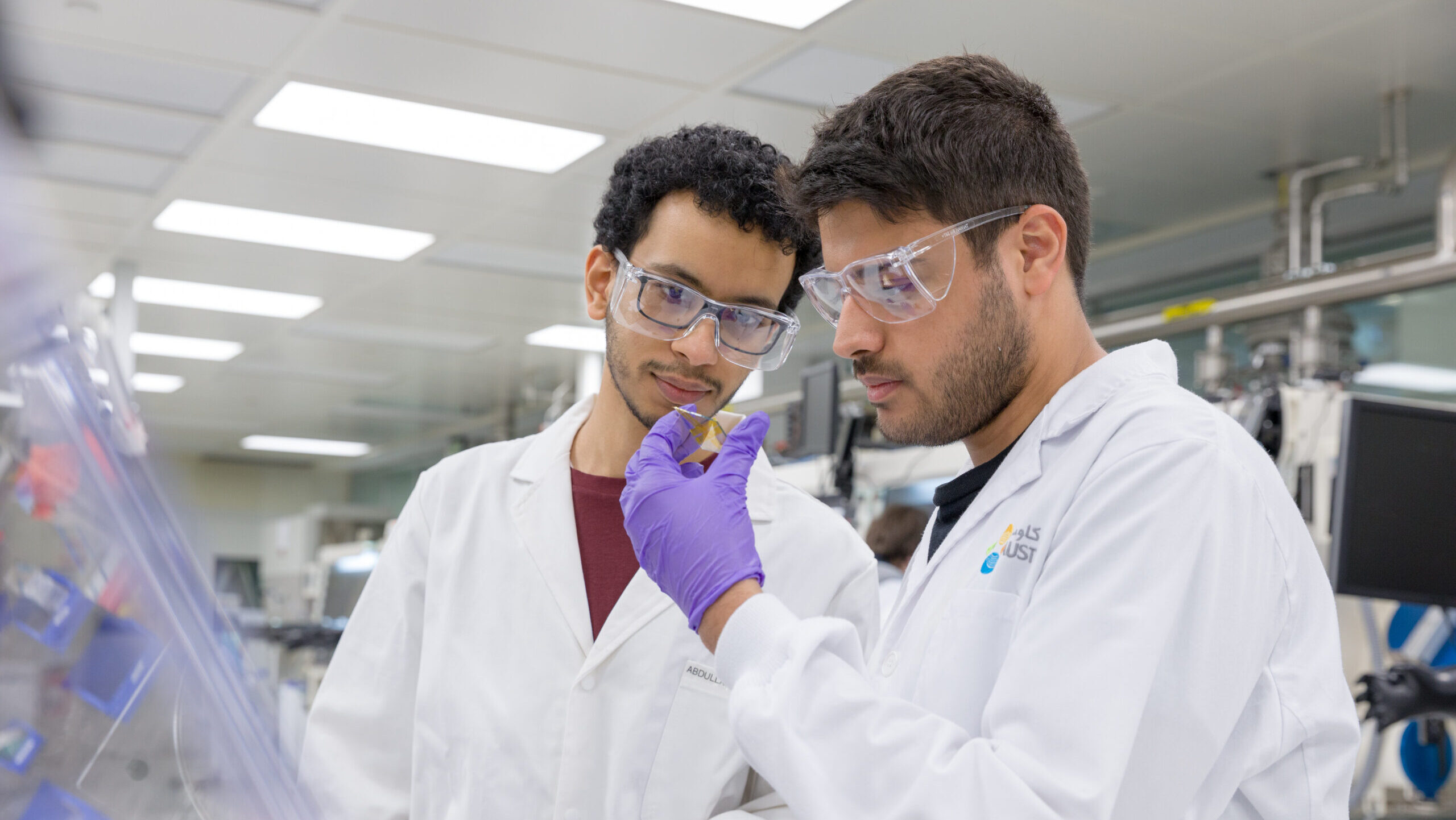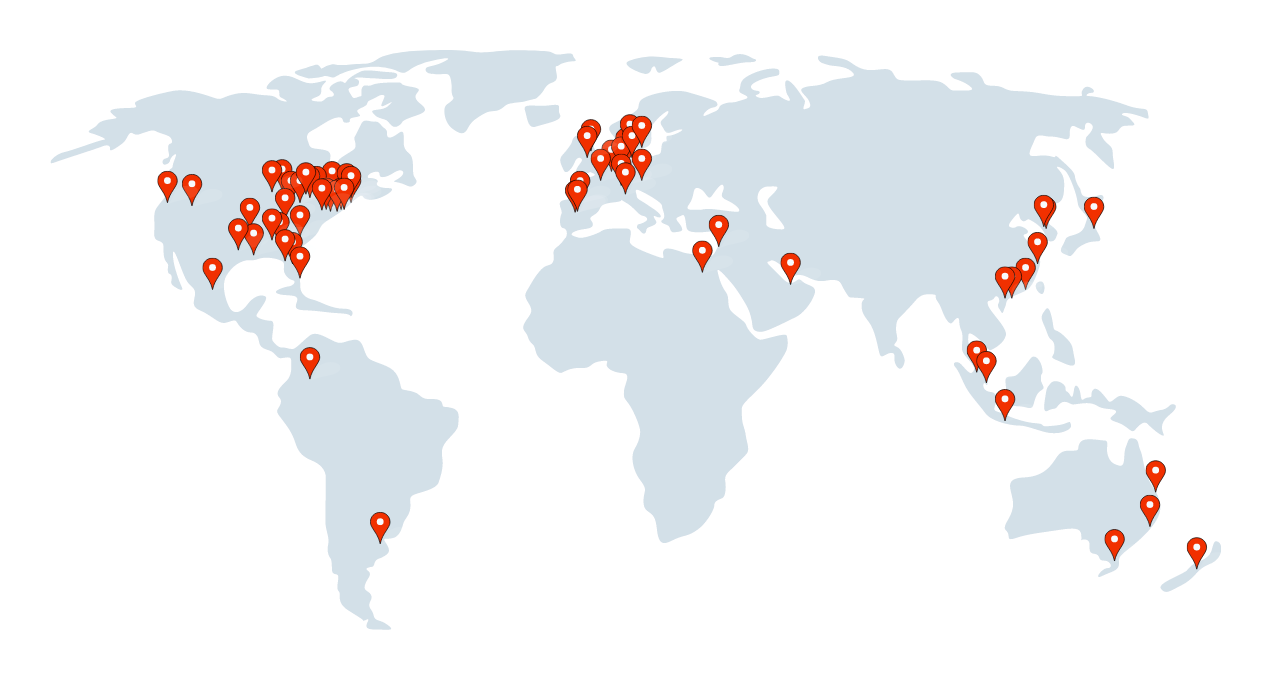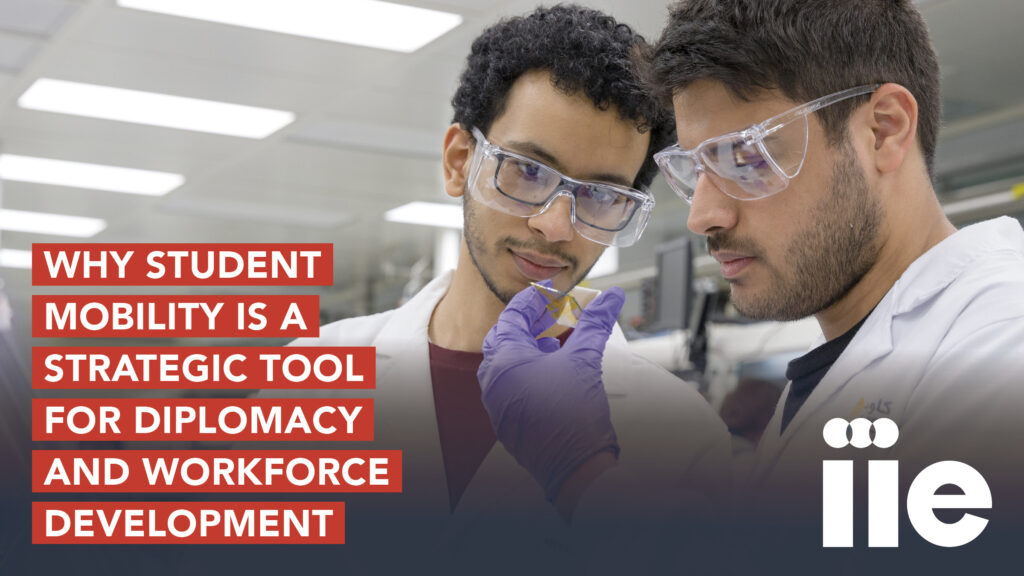
Why Student Mobility Is a Strategic Tool for Diplomacy and Workforce Development
IIE Connects Campuses Worldwide and Helps Countries Meet Global Talent Demand
Many countries increasingly view academic and professional exchanges as core to building skills, fostering innovation, and expanding their global influence. Educational exchange has been instrumental for governments seeking to foster bilateral cooperation, promote talent development, and raise economic competitiveness. These international education initiatives cultivate leaders while also contributing to long‑term national development, advancement across STEM fields, and other national priorities.
With targeted funding and in close cooperation, universities and governments can achieve multiple goals, including: 1) attracting high‑achieving students, particularly STEM, business, and language majors; 2) sending students to the United States to gain skills that contribute to national priorities; and 3) strengthening research collaboration and industry ties. The Institute of International Education (IIE) specializes in partnering with public and private sector organizations to design programs that advance these priorities, drawing on more than a century of expertise in scholarship program administration, a deep network of university connections around the world, and evidence‑based best practices. In addition to our long-standing work with premier international exchange programs such as Fulbright, we have partnered with esteemed global universities such as King Abdullah University of Science and Technology (KAUST) and NYU Abu Dhabi.
National Priorities and Student Demand in STEM Fields
Given the strong demand for STEM skills in today’s economy, it is important to understand the landscape of STEM education globally and within the United States.
There are an estimated 7 million globally mobile students worldwide pursuing higher education—a number that has nearly doubled over the last two decades. STEM disciplines now dominate global student mobility (Project Atlas, 2025), with a strong demand for STEM degrees as well as study or intern abroad programs that prepare students for the future of work.
U.S. institutions are responding to this demand according to the 2025 Open Doors Report on International Educational Exchange. More than half of international students come to the U.S. for its world-class STEM degree programs. And more than one‑quarter of Americans studying abroad are STEM majors, including engineering (6%), health professions (6%), math or computer science (4%), and physical or life sciences (8%). This alignment creates a strong opening for governments seeking to advance workforce development, innovation ecosystems, and public–private collaboration through targeted mobility programs that feed into these objectives.
How IIE Partners with Governments Worldwide
For governments interested in expanding educational exchange with the United States, IIE is a go-to partner for designing, implementing, and scaling education partnerships that deliver measurable outcomes.
Facilitating Strategic Partnerships
Through a structured curriculum, best-fit matching, and facilitated dialogues, IIE’s Center for International Partnerships connects U.S. and international institutions around defined national priorities such as digital transformation, advanced manufacturing, and health innovation.
Recent initiatives have involved R1 and regional public research universities, specialized technical colleges, community colleges, and private institutions, including:
- Thailand: 16 Thai and 11 U.S. universities are exploring agreements focused on STEM education and the digital economy, engaging public and private U.S. universities.
- Vietnam: 31 Vietnamese and 21 U.S. universities collaborated on engineering and semiconductor workforce development.
- India: Five Indian and 17 U.S. universities explored branch campuses, edtech, and industry-aligned higher education partnerships.
- Saudi Arabia: 80 Saudi and U.S. institutions participated in the inaugural Saudi-U.S. Higher Education Partnerships Forum to explore and strengthen educational collaboration.
Engineering and Experiential Learning
Study abroad among American engineering students has increased fivefold in 30 years, supported in part by IIE’s Global Engineering Education Exchange (Global E3) Consortium, which facilitates academic exchanges for engineering students between participating universities. Global E3 now includes nearly 70 top engineering schools across 69 countries.
IIE also delivers experiential learning programs that connect mobility to careers. Through initiatives like the Korea‑U.S. Special Exchange Program for STEM (KORUS), students gain direct exposure to research hubs, technology firms, and innovation ecosystems, strengthening long‑term talent and bilateral industry and research links.
Data-Driven Insights
IIE’s Research, Evaluation and Learning Unit offers a suite of services and products, including survey design, administration, and analysis; custom data; white papers and policy briefs; reports; and program evaluations. These evidence‑based insights enable governments to develop strategic engagement with U.S. institutions and strengthen national talent pipelines.
At IIE, we leverage our deep relationships with U.S. and global universities, expertise, and our international network of offices to design and deliver in-demand programming, resources, and services. Through the IIENetwork, for example, IIE convenes nearly 10,000 professionals from U.S. and international higher education institutions and organizations worldwide. We share best practices, host webinars and interactive discussions, and provide benefits such as first access to new data and student aid. Through this highly active, global network, IIENetwork members can stay on the cutting edge of higher education thought leadership and build relationships for fruitful collaboration.
In addition, IIE’s Generation Study Abroad resource hub is a collection of study abroad resources for students, families, and international education professionals. In our ongoing commitment to increasing the number of students participating in study abroad, we centralize the key study abroad research and publications to equip stakeholders. This includes Making the Case for Study Abroad, a quick reference for key data and talking points demonstrating the high-impact and value of study abroad for students and institutions linking IIE research and other source information to reinforce important outcomes such as gaining global knowledge and skills, improving academic degree outcomes, and preparing for the workforce.
Drive Impact with a Trusted Partner
The future of educational exchange will not be shaped by student interest alone. Targeted investment, evidence‑based strategy, and international partnerships are what will expand access and align mobility with national workforce and diplomatic goals.
For embassies and governments seeking to:
- Attract U.S. STEM talent,
- Deepen bilateral academic and research ties,
- Support regional development, or
- Build long‑term global talent pipelines,
IIE offers the scale, expertise, and trusted infrastructure to move from policy vision to measurable results—often within a single academic cycle. With the right partners, student mobility can become a cornerstone of national talent strategy and international engagement.
Learn more about how you can work with IIE.
The Course is Part of a Suite of Capacity Building Programs that IIE Supports in Partnership with the Heritage Commission
The Institute of International Education (IIE) partnered with the Kingdom of Saudi Arabia’s Heritage Commission and King Abdullah University of Science and Technology (KAUST) to conduct a transformative Underwater Cultural Heritage training course in Jeddah, Saudi Arabia. This initiative supports the Kingdom’s efforts to preserve submerged archaeological sites and aligns with Saudi Arabia’s Vision 2030 to promote heritage tourism, diversify the economy, and strengthen cultural identity.
Training the Next Generation of Marine Archaeologists
The two-week program trained Saudi heritage professionals in the identification, documentation, and conservation of underwater cultural heritage, including submerged artifacts, shipwrecks, and ancient coastal structures. Participants emerged as activated marine archaeologists, equipped to lead small-scale marine surveys and contribute to larger archaeological expeditions.
- Week One: Led by Dr. Emad Khalil, UNESCO Chair for Underwater Archaeology, participants explored the historical relationship between humans and the sea, international protections for submerged heritage, and the unique challenges of underwater archaeology in the Red Sea and the Gulf.
- Week Two: Practical sessions led by Francis Mallon at KAUST focused on archaeological scanning techniques, underwater photography, GIS applications in archaeology, and artifact conservation, providing hands-on experience in marine survey methodologies.
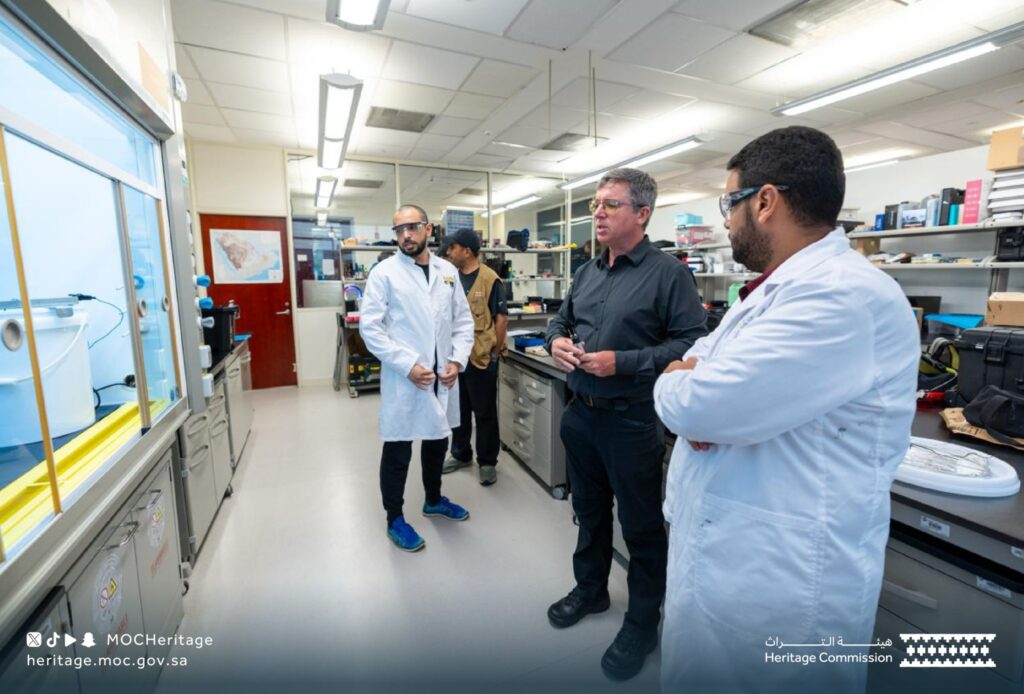
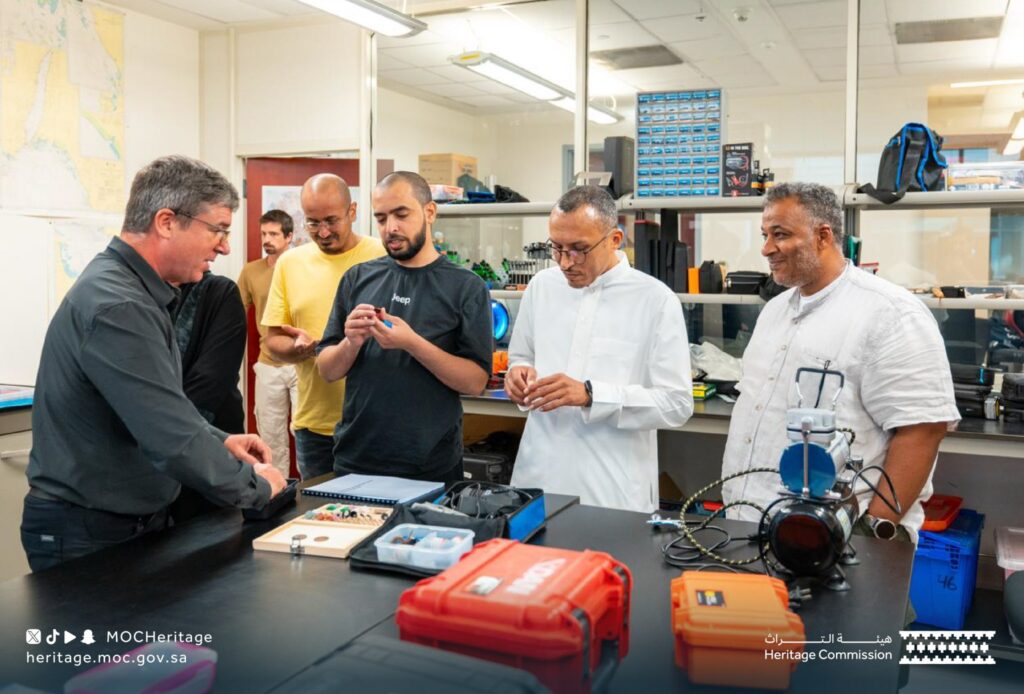
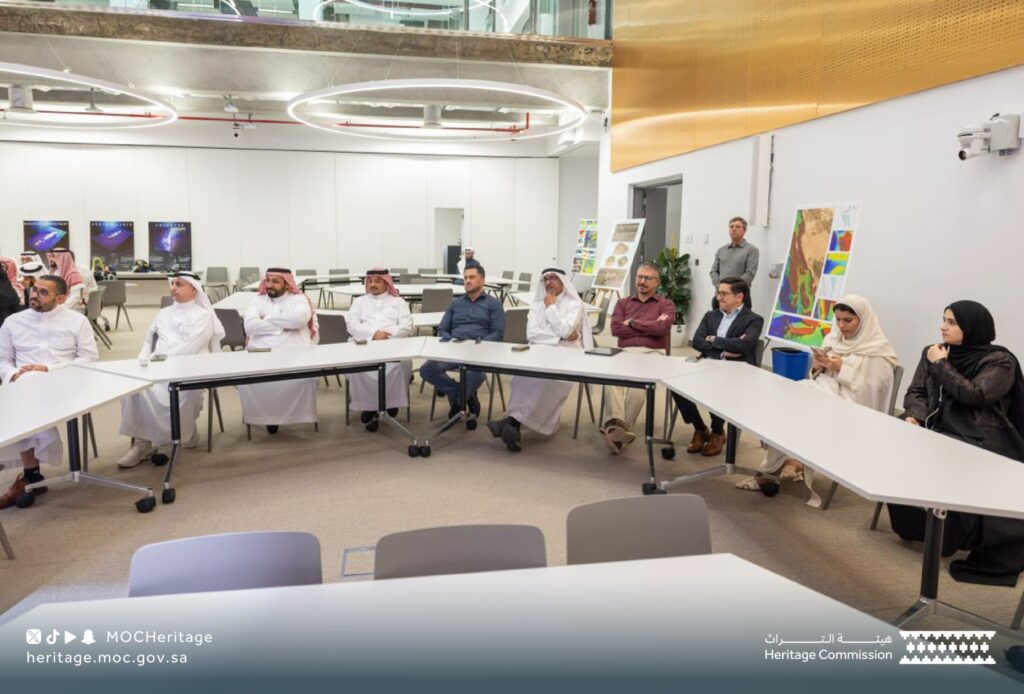
Advancing Vision 2030 Through Heritage Education
IIE’s Middle East Programs & Outreach Department worked closely with the Heritage Commission and KAUST to provide implementation and administrative services in preparing program materials, designing the application, and supporting the participants. This training course is part of a broader suite of cultural heritage capacity-building programs supported by IIE and the Heritage Commission, including the
- Heritage Horizon Program – advanced research writing for heritage professionals;
- Heritage Site Management Bootcamp – training for archaeological site managers; and
- Heritage Pioneers Program – skill development in heritage identification and preservation.
These initiatives are designed to support Saudi archaeologists, historians, anthropologists, and architects in the protection and promotion of the Kingdom’s rich cultural legacy.
Partnering for Sustainable Heritage Development
IIE is privileged to work with governments to implement professional development and training programs that promote economic development, advance scholarship, and improve lives. Contact Jonah Kokodyniak at development@iie.org or Jamal Alsayyed at jalsayyed@iie.org to learn more.
Welcoming Quad Fellows in Japan opens new opportunities for innovation and collaboration in STEM across the Indo-Pacific region
Since its 2023 launch, the Quad Fellowship by IIE has grown into a dynamic network of scholars advancing STEM innovation and fostering collaboration across the United States and Indo-Pacific. Initially conceived as a cooperative effort among the Quad nations—Australia, India, Japan, and the United States—the Fellowship has evolved into a strategic platform for cultivating global talent, driving scientific and technological progress, and strengthening partnerships that advance shared economic and security interests.
Strategic Expansion to Japanese Universities
In 2025, the Fellowship achieved a significant milestone by expanding to include graduate students based in Japan, made possible through a partnership with the Government of Japan. This expansion reflects a shared commitment among Quad nations to invest in education as a cornerstone to support the Indo-Pacific region. The Fellowship’s 2025 expansion to Japan marks a significant step in deepening strategic relationships among Quad nations. By supporting students at Japanese universities, the Quad Fellowship is expanding its reach and opening new pathways for interdisciplinary partnerships. Fellows in this expanded cohort will contribute their expertise in diverse STEM fields, build connections with peers from multiple countries and institutions, and drive collaborative research endeavors that address shared challenges.
The third cohort includes Fellows enrolled at leading universities in Japan and the United States, representing 11 countries and 29 STEM disciplines, including astrophysics, engineering, biotechnology, machine learning, environmental sciences, and quantum theory. As part of the expansion, the 2025 Quad Fellowship cohort also features 12 Fellows enrolled at prestigious universities in Japan alongside 25 Fellows studying at leading U.S. universities. This multidisciplinary group exemplifies the Fellowship’s dedication to building a future-ready workforce equipped to address critical challenges and accelerate innovation for the benefit of all participating countries.
Our Services

IIE partners with governments, universities, and private sector organizations to develop the next generation of global STEM leaders and advance STEM education worldwide through the administration of scholarship and fellowship programs. We build talent pipelines through comprehensive scholarship management services, including outreach and recruitment, selection, academic placement, student advising, and monitoring and evaluation, among other capabilities.
Cornerstone Event: The Quad Fellowship Summit
The annual Quad Fellowship Summit convened virtually in October under the theme, “Amplifying Collaboration for Innovation Across the Indo-Pacific.” This three-day event brought together Fellows from Japan and the U.S. for dialogues with Quad country leaders from government, academia, and industry. Participants noted the closing keynote delivered by Glen S. Fukushima, Visiting Fellow, Stanford University, reporting that his insights set an inspiring tone for their continued engagement and deeper collaborations across the Indo-Pacific. Summit discussions focused on shared priorities and the broader goals of the Quad Diplomatic Network—including maritime and transnational security, economic prosperity, and emerging technologies—underscoring the Fellowship’s role in shaping solutions for the most pressing challenges in the region.
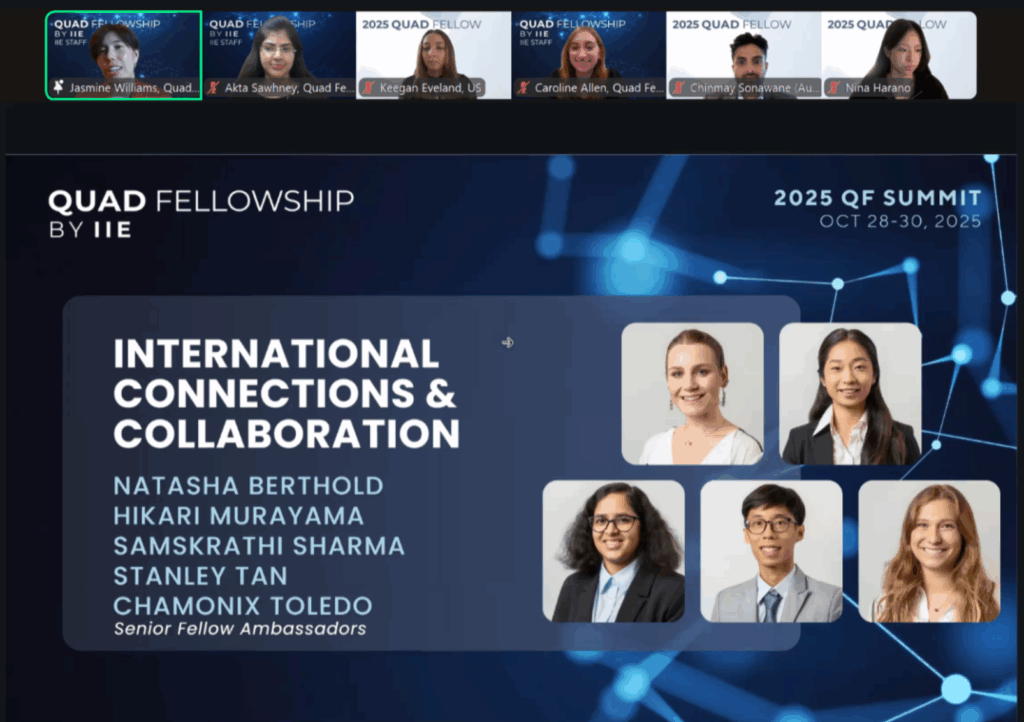
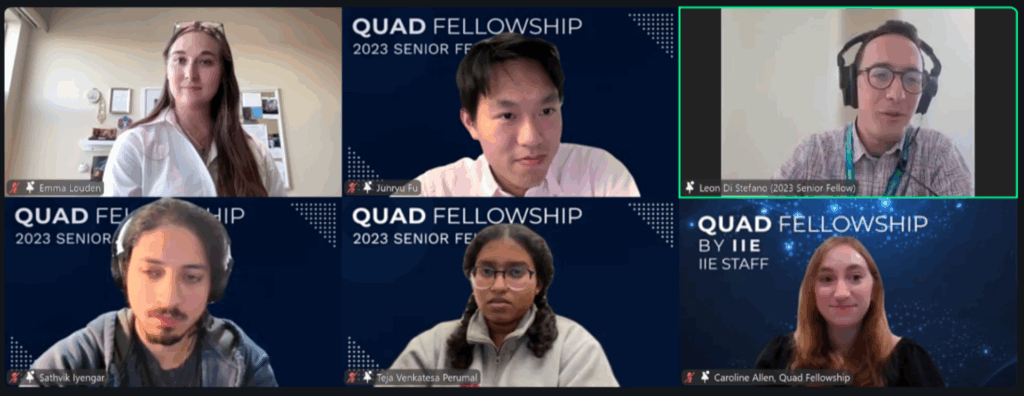

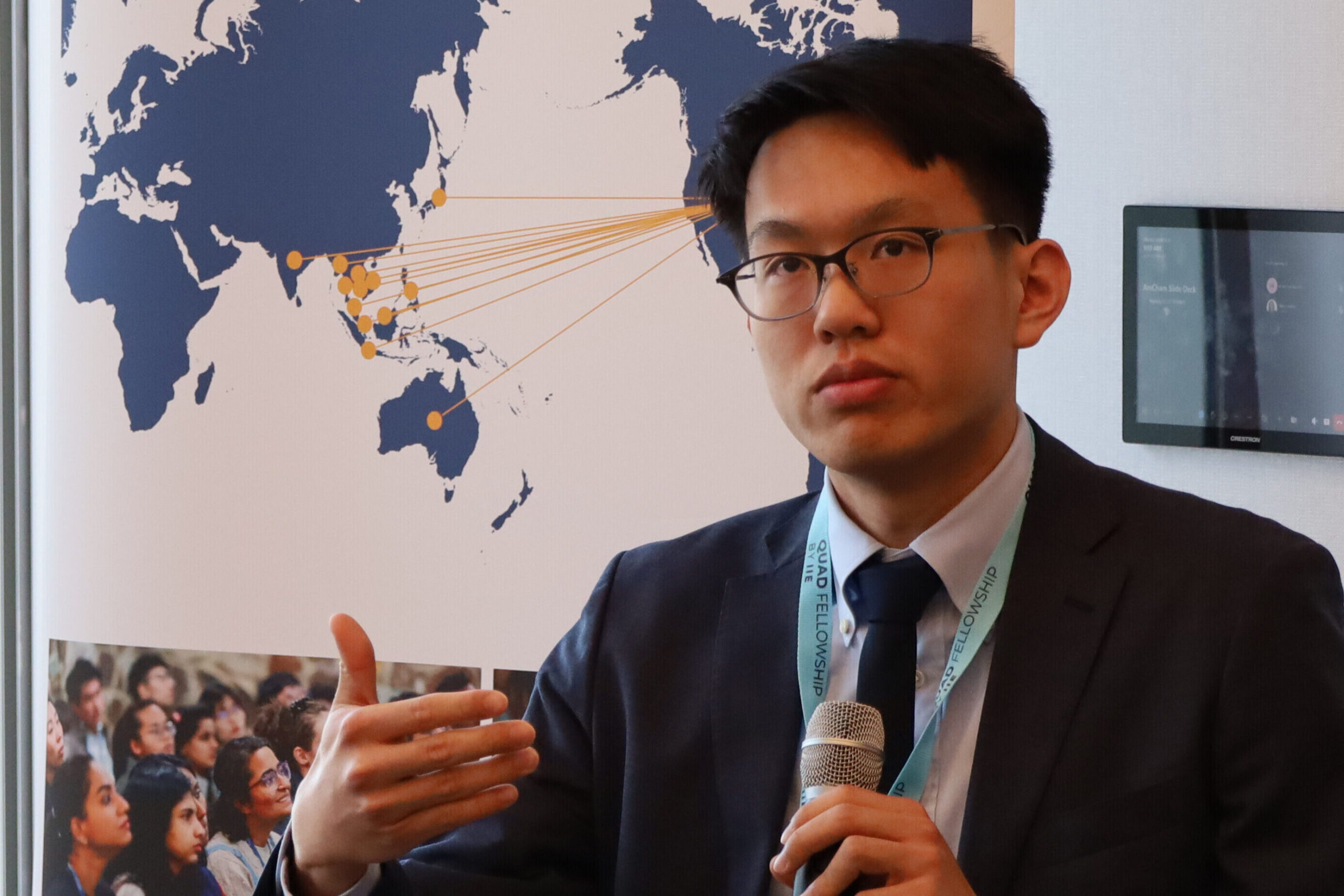
Looking Ahead: Expanding to Other Quad Nations
By supporting emerging STEM leaders, the Fellowship strengthens the knowledge economy of the Quad nations, fosters breakthroughs in STEM, and creates pathways for collaboration that reinforce stability and prosperity in the Indo-Pacific. The recent expansion to Japanese universities marks a pivotal step toward building a fully interconnected Quad network. In the coming years, the Fellowship aims to broaden its reach by hosting Fellows in Australia and India, further strengthening its mandate to serve as a bridge between academia, industry, and governments within the Quad framework.
IIE extends its gratitude to the Government of Japan and corporate partners, Google, the Pratt Foundation, and Western Digital, for their invaluable support and contributions to helping expand opportunities for emerging STEM leaders across the Indo-Pacific.
To learn more about the Quad Fellowship and meet the Fellows, please visit our website and follow on social media: Facebook, X, Instagram, and LinkedIn.
IIE’s Program Continues to Foster Collaboration Among Higher Education, Business, and Government
As global economies grow increasingly digital, higher education partnerships are emerging as powerful drivers of innovation, collaboration and opportunity. This year’s International Academic Partnership Program (IAPP) Thailand—led by IIE with support from the U.S. Embassy in Bangkok and in partnership with Thailand’s Ministry of Higher Education, Science, Research and Innovation (MHESI)—brought together leading universities from the United States and Thailand to explore new frontiers in STEM and the digital economy.
Why STEM and the Digital Economy?
This year’s theme reflects shared priorities between the United States and Thailand: preparing graduates for the future of work and building digital capacity across sectors. “Thailand’s investments in its digital economy strategy and the U.S.’s strength in applied research made this a natural focus,” said Sylvia Jons, Director of IIE’s Center for International Partnerships.
The focus also aligns with IIE’s broader mission to help institutions forge partnerships that advance national development goals and respond to evolving industry needs. Throughout the week, delegates engaged with private-sector leaders—including AMCHAM Thailand, Western Digital, Ford Motor Company Thailand, Gulf Development Public Company Limited, and Mitr Phol Research and Innovation—whose insights underscored the critical role of public–private collaboration in higher education and workforce development.
Selecting Institutions for Impact
This year’s participating institutions—11 from the U.S. and 16 from Thailand—were chosen through a competitive process emphasizing readiness for collaboration, strength in STEM disciplines, and interest in innovation-driven partnerships. The resulting mix included large research universities, regional public institutions, and specialized technical universities, creating fertile ground for diverse and meaningful exchanges.
Progress and Continuing Collaboration
The 10-month IAPP Thailand program included a U.S.-to-Thailand delegation in October 2025 and an upcoming reciprocal Thai-to-U.S. visit in February 2026. Early partnership discussions are already underway and will continue as Thai higher education institutions travel to the United States this February. During their visit, Thai delegates will participate in the AIEA Annual Conference in Washington, D.C., and visit U.S. colleges and universities in the region to further develop their partnership strategies and explore new areas for collaboration.
“These engagements represent a continuation of the momentum sparked in Bangkok,” noted Jonathan Lembright, Director of IIE’s Southeast Asia office, emphasizing the importance of sustained dialogue and connection between institutional leaders.
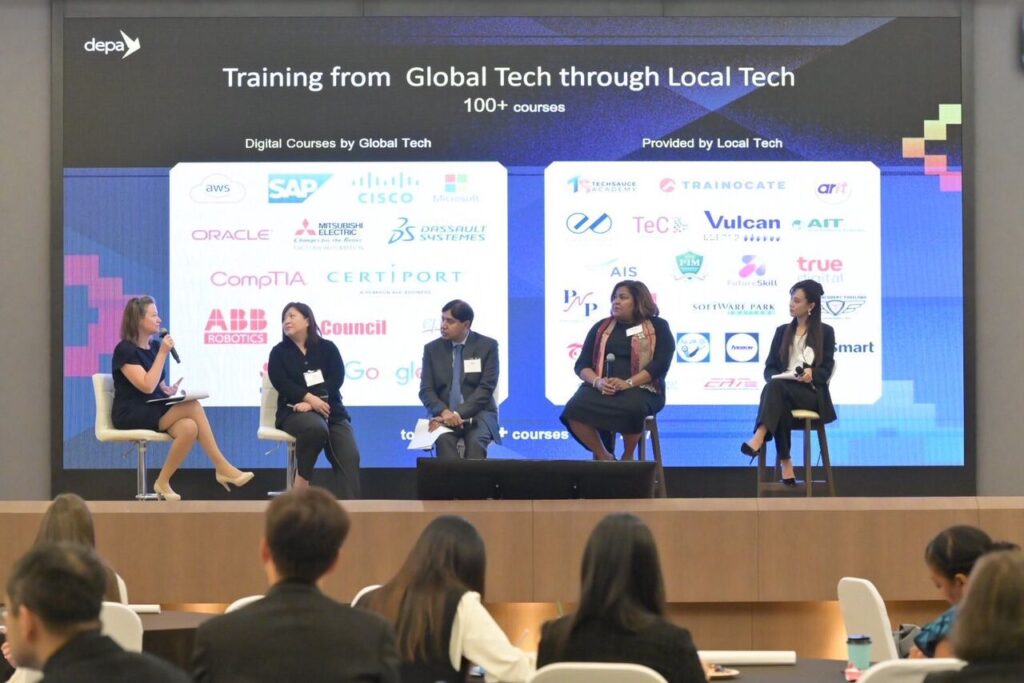
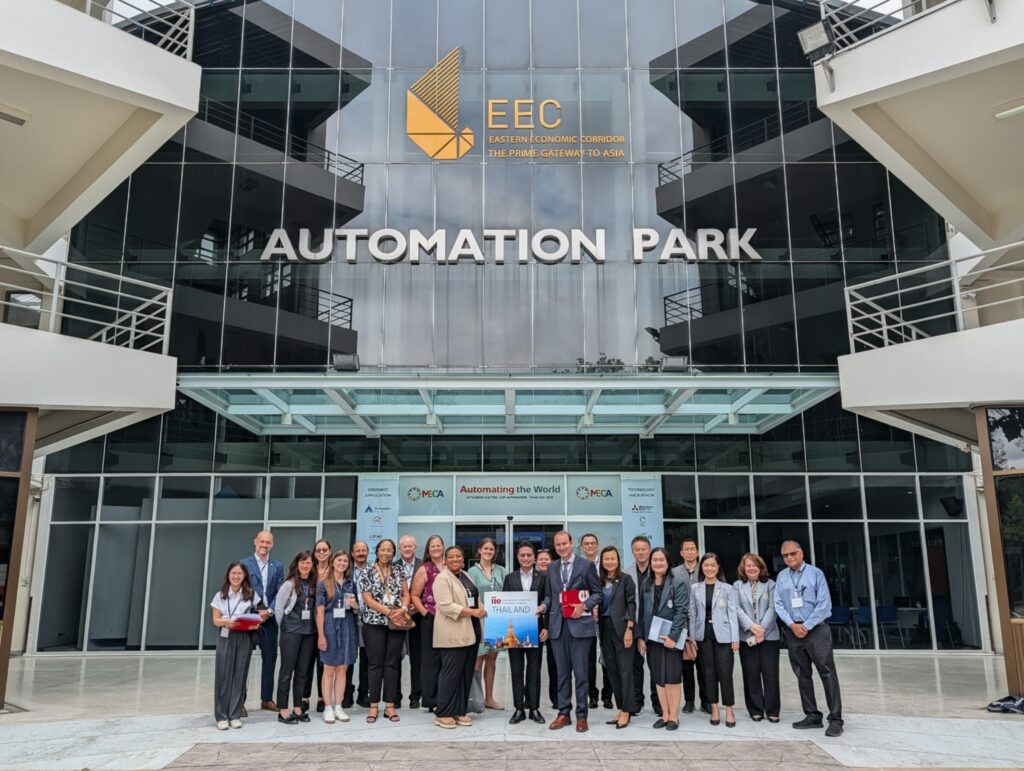
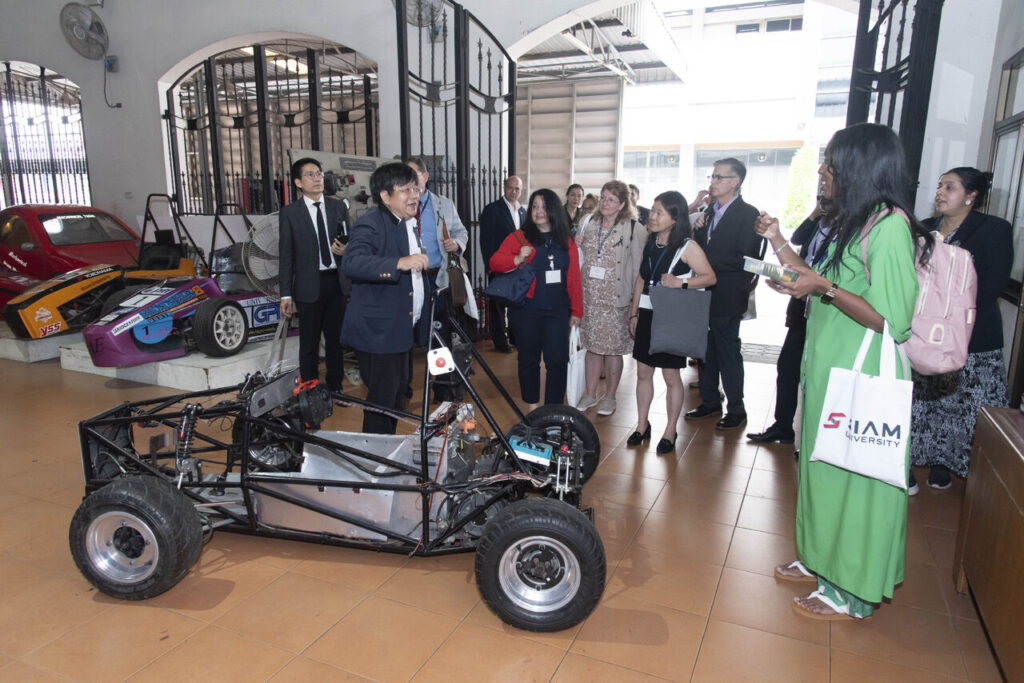
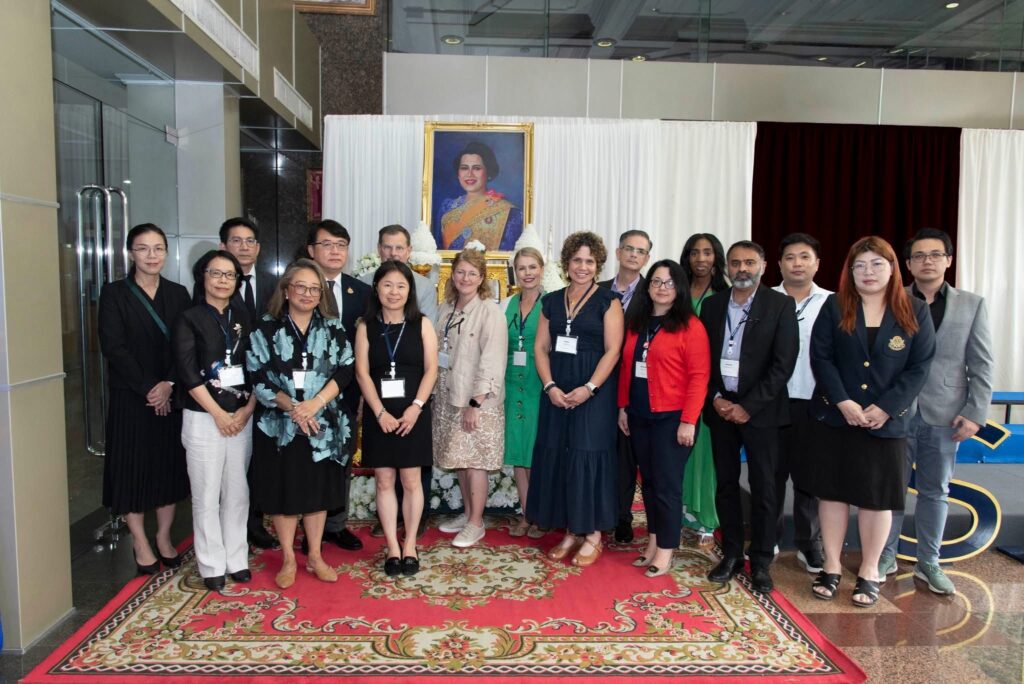
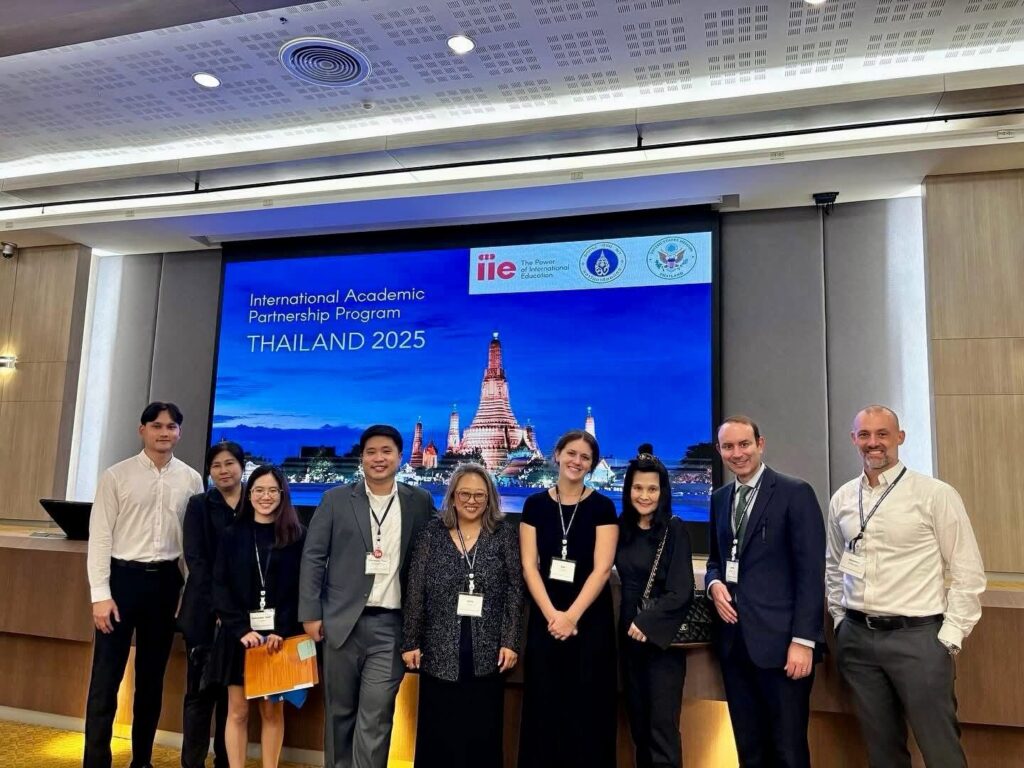
What’s Next
Participating institutions will continue to refine their partnership strategies with guidance from IIE’s Center for International Partnerships and IIE’s Southeast Asia office. Post-delegation workshops and webinars will focus on sustaining engagement, mapping joint projects, and connecting with industry and government stakeholders who can help translate ideas into lasting impact.
Looking ahead, IAPP Thailand will continue to foster collaboration among higher education, industry, and government partners as institutions put their plans into action. The connections established this year will carry forward into upcoming exchanges and joint initiatives, including the Thai delegation’s visit to the United States in February 2026. These ongoing engagements aim to strengthen long-term partnerships and advance shared goals in STEM education and the digital economy.
IIE extends its sincere appreciation to the U.S. Embassy in Bangkok, the Ministry of Higher Education, Science, Research and Innovation (MHESI), the Digital Economy Promotion Agency (DEPA) of the Ministry of Digital Economy and Society, and the Ministry of Foreign Affairs of the Kingdom of Thailand (MFA) for their partnership and support in making IAPP Thailand possible. Their collaboration has been invaluable in advancing dialogue between Thai and U.S. institutions and in promoting innovation and capacity building across the higher education and digital sectors.
U.S. Institutions
- Florida Atlantic University
- James Madison University
- Lehigh University
- Montclair State University
- Pennsylvania State University
- Tennessee State University
- Texas A&M University
- Texas Christian University
- University of Cincinnati
- University of Illinois, Urbana-Champaign
- Western Michigan University
Thai Institutions
- Bangkok University
- Burapha University
- Chiang Mai University
- CMKL University
- Khon Kaen University
- King Mongkut’s Institute of Technology Ladkrabang (KMITL)
- Mahasarakham University
- Mahidol University
- Naresuan University
- North Chiang Mai University
- Payap University
- Prince of Songkla University
- Rajamangala University of Technology Lanna
- Siam University
- Sripatum University
- Thammasat University
The Fall 2025 Snapshot on International Student Enrollment offers a critical look at international student enrollment trends in U.S. higher education, providing numbers as recent as the current fall semester. This report provides insights into where international education stands today and where it could be headed. Here are four things to know.
1. More Than 825 Institutions Participated
This year’s Fall Snapshot saw 828 institutions respond, one of the highest participation rates to date. These institutions represent 63% of all international students reported in Open Doors, making this dataset a robust reflection of current trends in U.S. international education.
2. Overall, Total International Student Numbers Hold Steady
As of Fall 2025, U.S. colleges and universities reported a 1% overall decline in international students, including both enrolled students and those on optional practical training (OPT). Trends varied by academic level, with undergraduate and OPT enrollments up by 2% and 14%, respectively. The numbers of graduate and non-degree student enrollments are down by 12% and 17%, respectively.
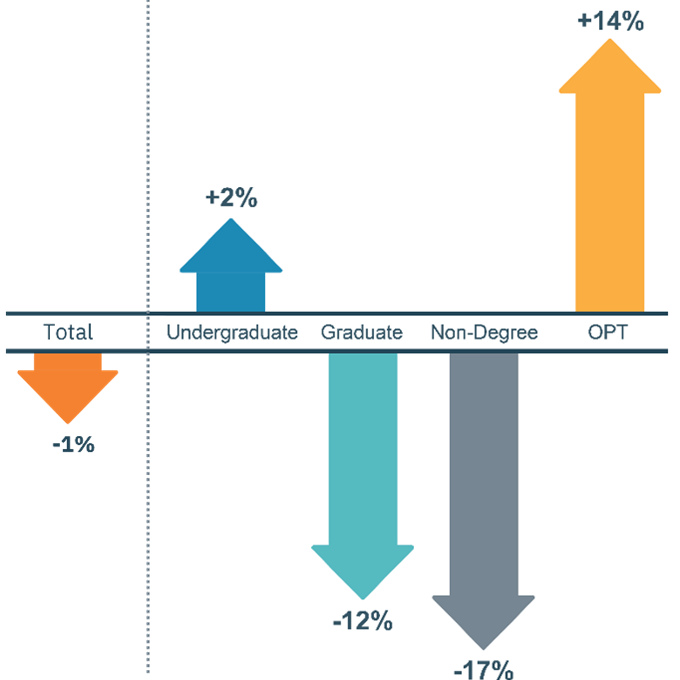
3. New International Student Numbers Declined
New enrollments of international students, those studying at their college or university for the first time, fell by 17% compared to last year. Approximately 29% of institutions report an increase in new international enrollment, 14% indicate stable numbers, and 57% note a decrease. Institutions also indicate providing flexibility to international students admitted to their programs, but who have not arrived in the United States for their academic studies. Nearly three-quarters (72%) offered admitted international students deferrals to spring 2026, and more than half (56%) provided deferrals to fall 2026.
4. Colleges & Universities Show Strong Support for Internationalization
The vast majority – 84% – of institutions rank international student recruitment as a priority. U.S. institutions cite prioritizing international student outreach and recruitment due to the value of international student perspectives on campus, the financial contributions of international students, and alignment with institutional strategy. Financial support for outreach and recruitment is holding steady or increasing at 78% of institutions, signaling resilience and long-term commitment to global engagement.
As international education continues to evolve, staying informed on these trends is key to shaping strategies that attract top global talent and strengthen competitiveness.
Fall Snapshot Report on International Student Enrollment
The IIE Scholar Rescue Fund Has Awarded Fellowships to 34 Sudanese Scholars, Placing Them in 13 Countries
Dr. Khalid Mohammedsalih was conducting research at the University of Nyala when fierce fighting erupted in Sudan’s capital, Khartoum, upending his life and the lives of millions.
“This began a very tough time for my family and me, for all people in Sudan,” said Dr. Mohammedsalih, a veterinary parasitologist whose laboratory was destroyed in the violence. “My family and I had to flee for our lives several times, at first within Sudan, and eventually out of the country.”
Since clashes erupted between the national army and the paramilitary Rapid Support Forces in April 2023, nearly 13 million people have been displaced and tens of thousands killed in Sudan; in addition, a major famine has taken hold. The international community has called it the world’s largest humanitarian crisis.
Dr. Mohammedsalih’s story reflects the academic fallout of the war. A 2025 study on the impact of the war confirmed the widespread destruction of higher education infrastructure and services within the country, which has displaced thousands of professors, researchers, administrators, and students. Sudanese academics’ careers and lives have been interrupted, and their futures remain uncertain as war has engulfed Africa’s third-largest country.
“Sudan’s once-robust research sector and higher education system has been devastated by the ongoing war,” said IIE Scholar Rescue Fund Director James R. King. “This has already led to long-term challenges for the country, including hindering scientific progress, deepening poverty, and weakening social cohesion. Preserving the knowledge and expertise of Sudanese scholars by providing safe environments for their continued scholarly work is essential to the future rebuilding of a safe and stable future Sudan.”
Through the IIE Scholar Rescue Fund (IIE-SRF), displaced scholars like Dr. Mohammedsalih find refuge and have the opportunity to continue their work and contribute to a new academic community. His research— sparked by his experience working in a veterinary pharmacy in Sudan, where farmers reported ineffective treatments —focuses on antiparasitic resistance in livestock. He is the first researcher to study this significant problem from the field level to the genome in Sudan.
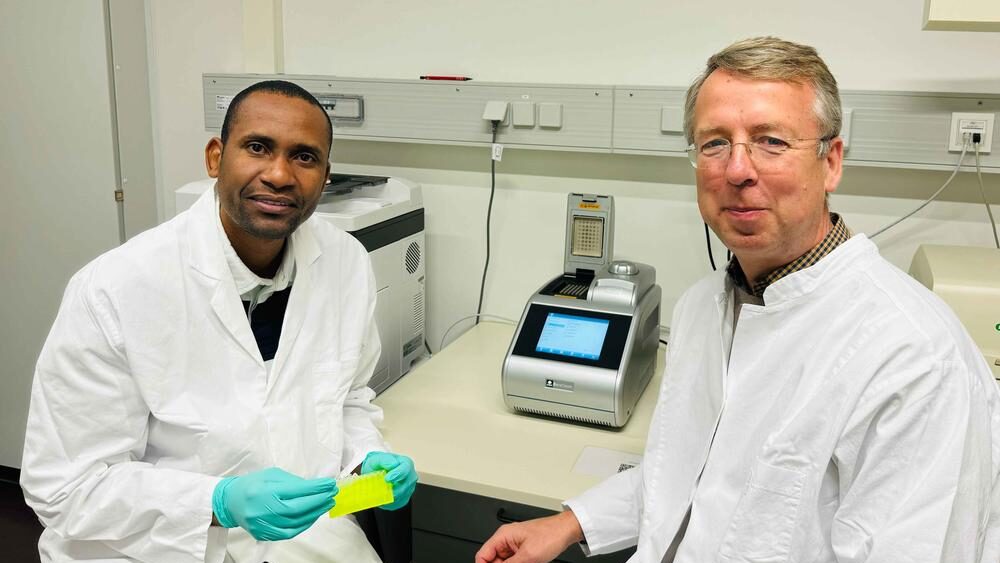
Since December 2023, he has continued his work at the Institute of Parasitology and Tropical Veterinary Medicine at Freie Universität Berlin, analyzing data he collected before the war broke out and preparing it for publication.
“After all, we are an institute specifically for tropical veterinary medicine,” says his research partner at the host university, Georg von Samson-Himmelstjerna. “With his knowledge, experience, and data from Sudan, Khalid Mohammedsalih makes a highly valuable contribution to our institute.”
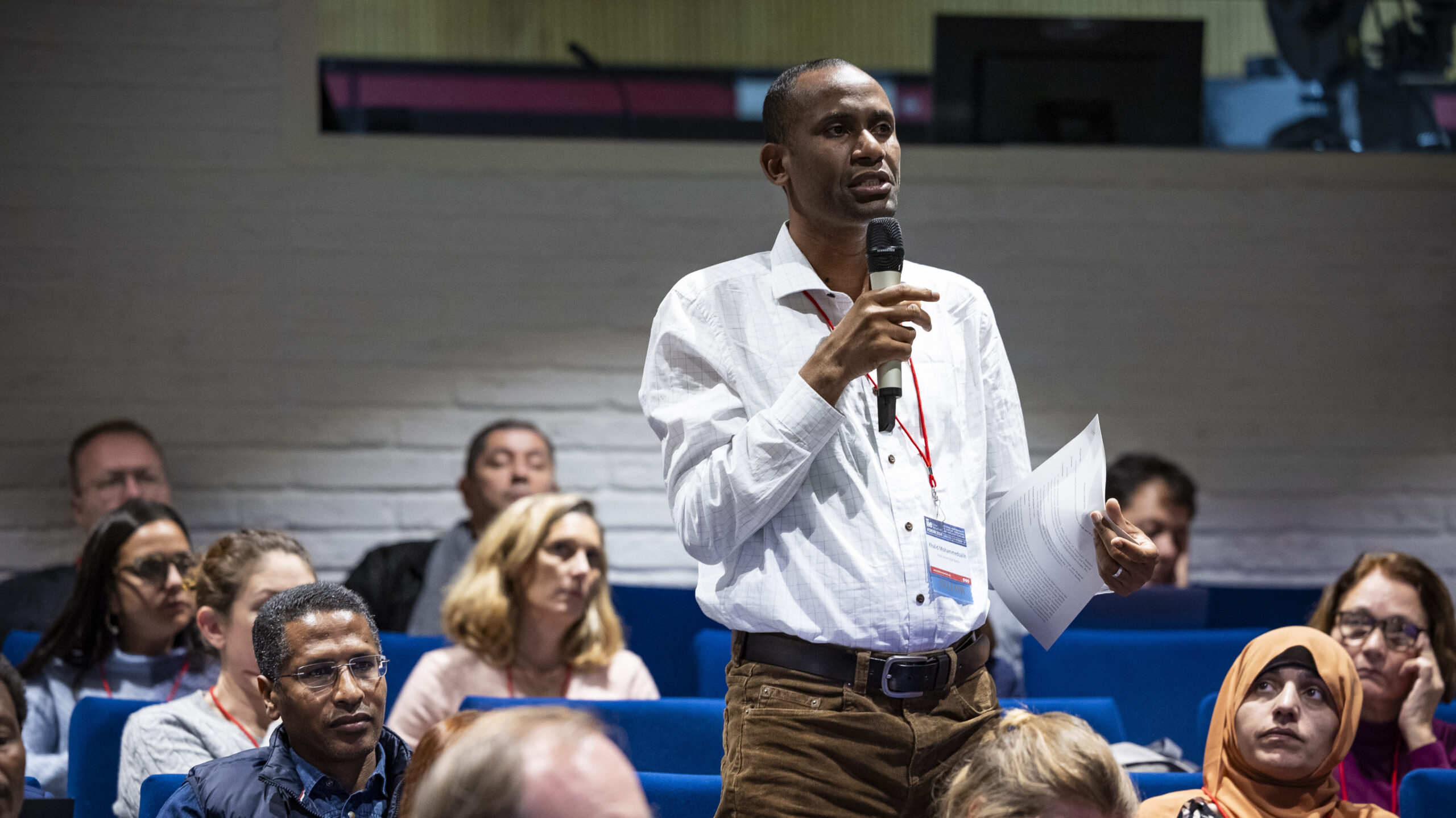
Sudan accounted for a record half of all IIE-SRF applications in 2023, underscoring both the scale of the crisis and the resilience of Sudan’s academic community. Since the conflict began in April 2023, IIE-SRF has awarded 46 fellowships to 34 Sudanese scholars. Nearly half of the recipients are women. Nineteen Sudanese scholars are now undertaking fellowship appointments at host institutions across four continents, including the Czech Republic, Egypt, Germany, Jordan, Kenya, Malaysia, Oman, South Africa, the United Arab Emirates, and the United States.
Enriching Host Communities
Displaced scholars bring expertise and capacity to their host institutions. Dr. Iman Dawelbeit, a Sudanese expert in medical entomology and public health, is now an IIE-SRF fellow at the International Centre of Insect Physiology and Ecology (icipe) in Nairobi, Kenya. Her research focuses on the plant-feeding behaviors of sand flies and mosquitoes that carry disease, developing new environmentally friendly tools to monitor and control these vectors.

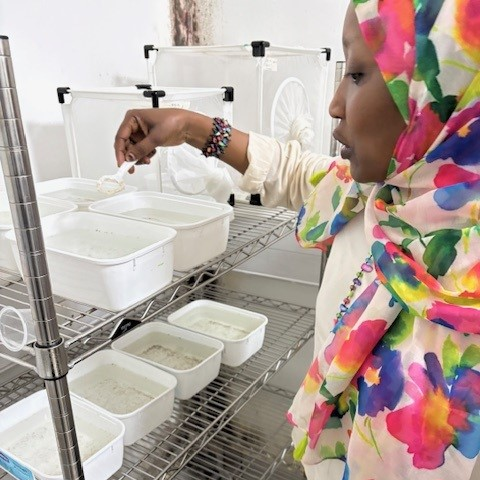

In late October, IIE Scholar Rescue Fund Director James R. King had the opportunity to meet with her at her host institution, where she is able to continue her work in safety alongside an international community of researchers. Through her research, she aims to build the capacity needed to address local public health challenges—work that will be essential when she is able to return to Sudan.
The IIE-SRF fellowship at icipe gave me hope, energy, and the support needed to advance research on insect behavior, improve public health, and tackle vector-borne diseases in Sudan and beyond,”
Dr. Iman Dawalbeit
IIE-SRF Fellow from Sudan
At Sultan Qaboos University in Oman, IIE-SRF fellow Dr. Yahia Tahir, a scholar of archaeology and zoology, is documenting the impact of Sudan’s war on archaeological artifacts while contributing to his host institution. He has led student field visits and participated in archaeological digs, discovering stone hand tools that offer new evidence of human settlement in northern Oman dating back to the Middle Paleolithic period.

“Dr. Tahir has proven to be a valuable asset, contributing significantly to the institution’s academic and cultural environment,” said Dr. Mohamed Hesein, head of the university’s archaeology department. “This hosting experience also helped the institution refine its approach to integrating international scholars, paving the way for smoother collaborations in the future.”
IIE-SRF plays a critical role in safeguarding national academies during times of war and in restoring educational systems once crises end. By supporting scholars to continue their work in safety, IIE-SRF helps preserve the knowledge and expertise that will be essential to rebuilding Sudan’s higher education system—a cornerstone of economic recovery and self-reliance, peacebuilding, and societal progress.
“We at IIE-SRF are deeply humbled by the talent, dedication, and resilience of Sudan’s scholars, and we are honored to support our Sudanese fellows,” said King.
Pastoral farming is a vital sector that secures the livelihood of a large portion of Sudan’s population. Mohammedsalih hopes his research in Germany will help strengthen Sudan’s agricultural system.
“We now have the data that proves farmers are correct in their assessment. The medications do not, in fact, work as they did before, and there is a risk of serious consequences if we do not reverse this trend. We need further research and political measures to stop such a development,” said Mohammedsalih.
Support scholars from Sudan and around the world with a gift to IIE and the Scholar Rescue Fund.
With Support from The Rockefeller Foundation and Outrider Foundation, 52 U.S. Students Engaged in International Development Fellowships in Africa, Southeast Asia, and Latin America.
Last summer, fifty-two American undergraduate and graduate students had the opportunity to support communities in Africa, Southeast Asia, and Latin America as part of the NextGen Service Fellowship. The fellowship—supported by The Rockefeller Foundation and Outrider Foundation and managed by IIE—connected the fellows with organizations focused on in-demand fields such as public health, economic development, sustainable agriculture, and education.
We asked six fellows to share the most compelling aspects of their fellowship experiences and how those experiences enhanced their understanding of international development.
Joshua Cain, University of Kentucky
Fellowship Location: Ecuador
Host Organization: Centro de Salud Hombro a Hombro clinic and Shoulder-to-Shoulder Global Medical Brigade
Field of Study: Doctor of Physical Therapy
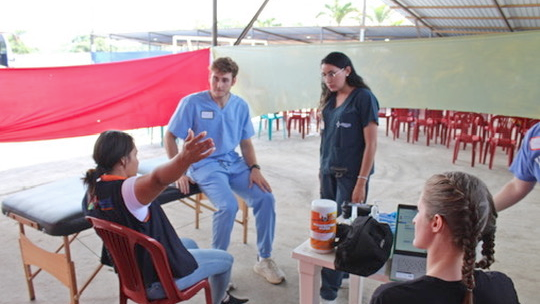
Part of my internship this summer involved creating and leading exercise classes at a clinic, Centro de Salud Hombro a Hombro. We worked with two groups: one made up of individuals with chronic health conditions such as hypertension and diabetes, and another younger group, with whom we focused on prevention. We held one to two classes per day, tailoring the programs to the participants’ responses. This required adapting exercises by progressing or regressing the difficulty in real time, which greatly improved my critical thinking and prescription skills.
As a future physical therapist, this experience reinforced the importance of meeting people where they are, rather than trying to force a rigid program that may not fit their needs. These classes also gave me deeper insight into the health challenges faced by local communities. Health literacy was not widespread, and conditions like hypertension and diabetes were common. Something as simple as access to proper footwear was a major barrier, often leading to additional musculoskeletal issues. While the health care system in the United States is not without flaws, this experience made me more appreciative of the resources available to me at home. More importantly, it taught me to think critically about the cultural and socioeconomic contexts that shape health outcomes. This perspective will help me as a clinician to treat the whole person, not just their diagnosis.
Tryphene Bulape, Boise State University
Fellowship Location: Thailand
Host Organization: Save the Children Thailand
Field of Study: Social Work
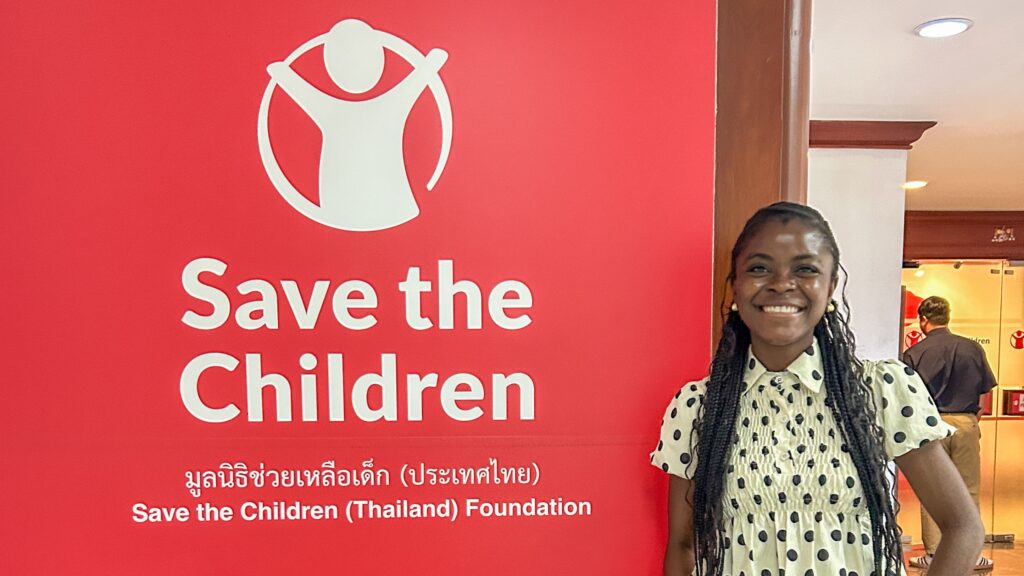
This experience gave me insight into how many moving parts it takes for an organization to be successful. We were small teams working within a larger mission, and that gave me a perspective on just how challenging and demanding this work can be.
Someone I met during my fellowship, who greatly impacted me, was a fellow intern placed in Mae Sot, a city that shares a border with Myanmar. Hearing about her experience working at the border with students from Myanmar and learning about students’ very limited opportunities to receive a formal education was extremely eye-opening. I also learned a lot about nationalism and the different ways countries display their priorities when balancing fairness between host communities and incoming refugees.
Jamal Washington, Columbia University
Fellowship Location: Colombia
Host Organization: Fundación Innovación para el Desarrollo (FIMASD)
Field of Study: International Affairs
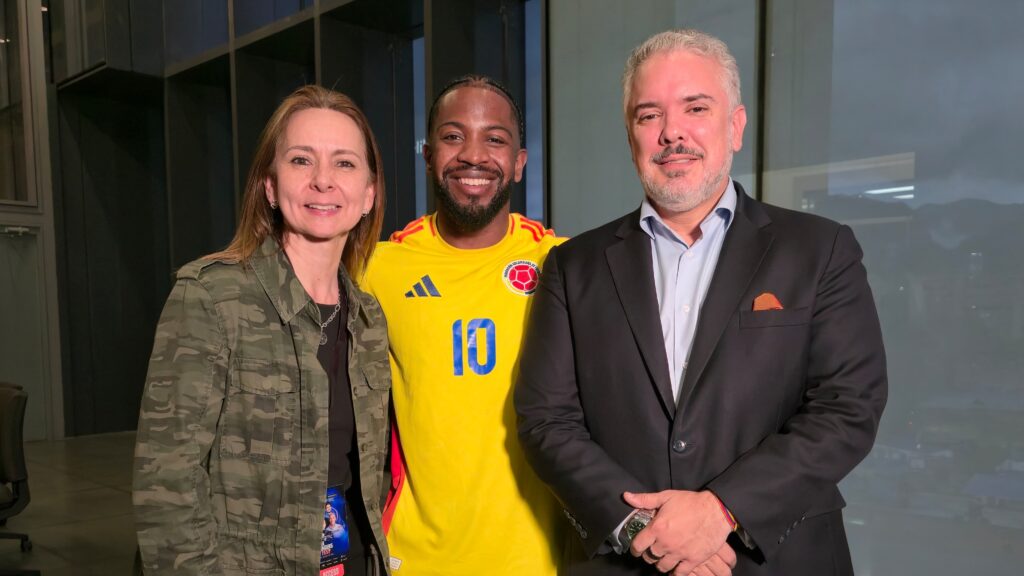
Coming from Columbia’s School of International and Public Affairs (SIPA), I was eager to put theory into practice, but I quickly realized that the realities of working in Colombia required more than U.S.-centric policy knowledge. Above all, it required intentional listening, creativity, and flexibility. I have grown tremendously from navigating intercultural challenges in real time.
A particularly unique aspect of my fellowship was the chance to meet former Colombian President Iván Duque, who founded FIMASD, the non-partisan think tank that hosted me. Conversing with him about the current affairs of Colombia — and even celebrating his birthday with him — offered incredible insight into the issues Colombia faces and the vision behind FIMASD. Hearing directly from him about the role of youth, innovation, and policy in Colombia’s future added depth to my understanding of the institutional space I was contributing to, and it was inspiring to see how ideas at the highest levels connected with the student-led initiatives I was evaluating.
Julia Vogel, University of Wisconsin–Madison
Fellowship Location: Indonesia
Host Organization: Green Moluccas
Field of Study: International Affairs

I interned at Green Moluccas this summer, a sustainability and disaster management non-profit. The most compelling part of their work is how they bring all of this together: education, direct action, and collaboration. It really showed me that even with limited resources, you can create momentum for a cleaner, healthier, and more sustainable future.
On a personal level, this experience also completely shifted how I think about grassroots environmental work. It reminded me that small, practical steps such as teaching kids or creating a local recycling system can add up to something much bigger over time. These efforts may not sound flashy, but they build the foundation for long-term change. And honestly, seeing that in action was both humbling and motivating. Green Moluccas showed me that real change starts with community, creativity, and a lot of heart, and I left feeling so grateful to have been a small part of it.
Noah Willsea, Clemson University
Fellowship Location: Ethiopia
Host Organization: PHE Ethiopia Consortium
Field of Study: Agriculture
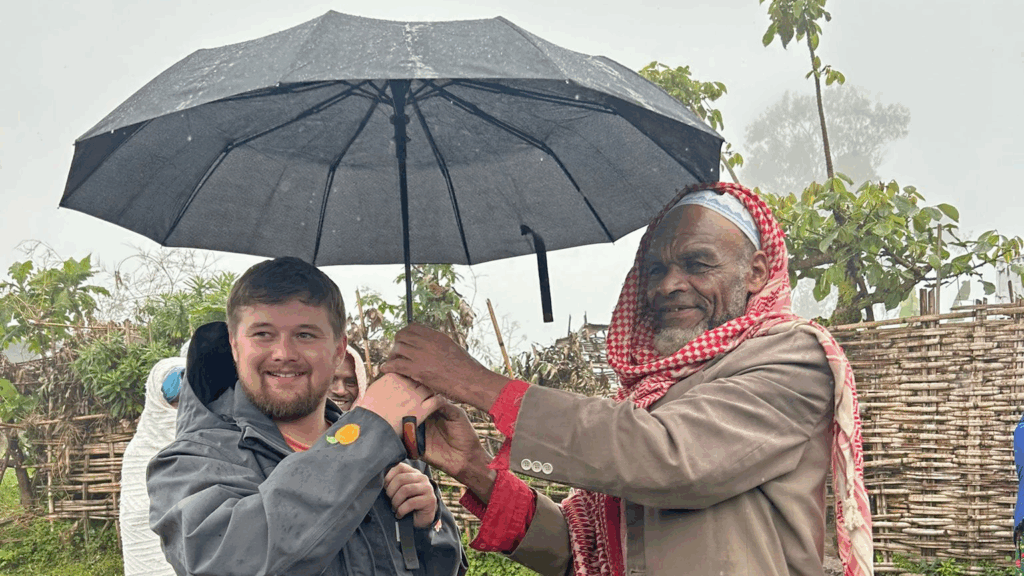
I interned with the Population, Health and Environment Ethiopia Consortium (PHEEC), which serves Ethiopia through sustainability and health programming.
The biggest lesson I learned was that sustainability is not one-size-fits-all. Even in America, the term sustainability gets thrown around without much thought in a lot of different cases, but in Ethiopia, the problem was really glaring to me.
Western ideas of sustainability were often thrown into situations where they just do not quite fit. For example, in the U.S., I studied the environmental challenges associated with the overuse of synthetic fertilizer.
However, in many parts of Ethiopia, most farmers do not have access to synthetic fertilizer, and their main agricultural concern is being able to produce enough food to feed their family and survive the year. Frankly, there are big challenges that require comprehensive solutions.
Looking back, however, I am grateful to have borne witness to the amount of hope among the Ethiopian people and those who serve them. I also valued the deep sense of community I observed and participated in—not just among my coworkers but also local community members and visitors. They often drank coffee together, ate meals together from a shared plate, listened to local music, taught me new words from their languages, and looked after each other’s children. Working side by side, people build friendships and memories that may not continue for more than a few moments but will certainly continue in one another’s prayers.
Kahtara Harris, Johns Hopkins University
Fellowship Location: Mexico
Host Organization: Otros Dreams en Acción
Field of Study: Communications and Journalism
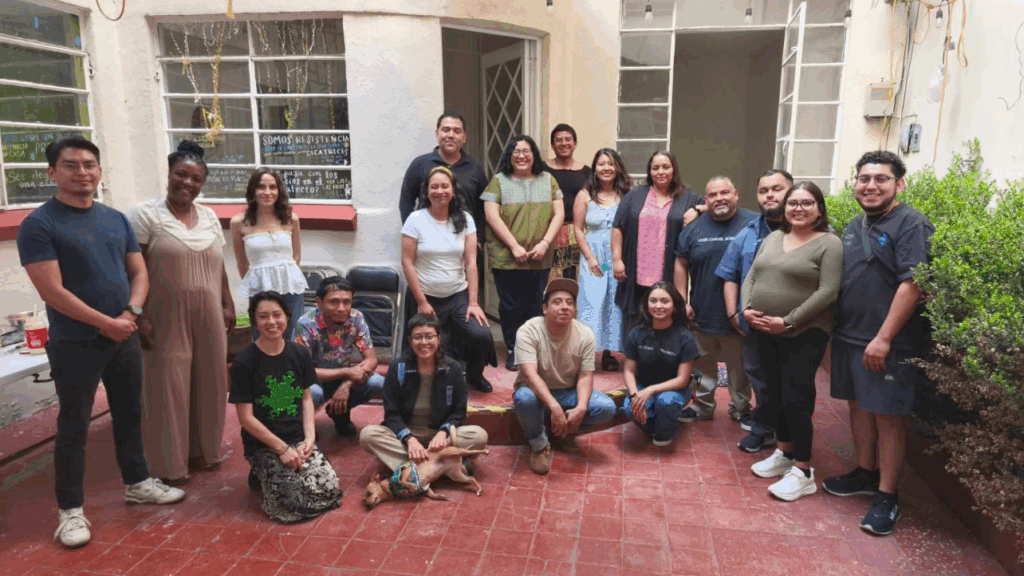
My main project involved tracking and cataloging ODA mentions and interviews in the news, which gave me a front row seat to how their voice reaches the broader public. It was steady, behind-the-scenes work that gave me a new appreciation for the daily operations that keep a nonprofit running. Beyond this work, my fellowship included weekly training led by an outside organization. These sessions pushed me to think differently about equity, leadership, and collaboration across cultures. I also looked forward to our weekly “family meals,” where staff and fellows came together around food. That time was just as valuable as the formal training.
Looking back, I see my month in Mexico City as more than a fellowship. It was a chance to be welcomed into a workplace that shared responsibilities, culture, and community. ODA made me feel included from the first day, and IIE created the platform that allowed me to step into this experience in the first place. I came away with stronger skills, new friendships, and a clearer view of how nonprofits function across borders. Most of all, I left with gratitude for the team that shared their work with me, and for the opportunity to contribute, however small, to something so necessary and powerful.
The NextGen Service aims to inspire and equip the next generation of American public service leaders through immersive, hands-on experience working in and with communities around the world, including Sub-Saharan Africa, Southeast Asia, and Latin America and the Caribbean. Learn more: https://www.iie.org/programs/nextgen-service-fellowship/
This September, the Institute of International Education (IIE), in collaboration with the Kingdom of Saudi Arabia’s Heritage Commission and SOAS University of London, officially launched the Heritage Horizon Program, a groundbreaking initiative designed to support heritage professionals and researchers in Saudi Arabia to publish academic work in international journals.
A New Chapter for Saudi Heritage Research
The program began with a dynamic five-day workshop held in Riyadh from September 17 to 22, organized by the IIE National Researchers’ Support Team that includes Susan Muendl, Shifaa Alsairafi, and Alex Iadanza within the Middle East Programs and Outreach Division directed by Jamal Alsayyad on behalf of the Heritage Commission in Saudi Arabia. The workshop welcomed 15 participants from a range of heritage sectors, including:
- Intangible Cultural Heritage
- Underwater Cultural Heritage
- Urban Heritage
- World Heritage Site Management
- Archaeology and Antiquities
Experts from SOAS University of London, including Charlotte Horlyck, Rachel Harris, Scott Redford, Aylin Orbasli, and Stephen Murphy delivered lectures on their topics of expertise, including Islamic archaeology, art history in South Korea, underwater cultural heritage, and urban heritage. They were joined by local and international guest lecturers including Saudi traditional arts expert Abdulaziz Alburayek, Katherine Fennelly, and Graeme Earl. The goal of the workshop in Saudi was to introduce the participants to the breadth of Heritage disciplines and engage in discussions on cultural heritage in a global context.
IIE provided consulting services to design the Heritage Horizon program for the Heritage Commission which will strengthen capacity for cultural heritage studies and expand the reach of Saudi heritage scholarship across the world. In this capacity, IIE developed the structure for the nine-month program and partnered with SOAS University of London to fully develop the curriculum, set desired outcomes, and deliver content. IIE worked with program partners to design the application, recruitment strategy, and selection process to identify competitive candidates. The participants were selected by a committee comprised of representatives from IIE, SOAS University, and the Heritage Commission. IIE also organized and implemented the logistics for the opening workshop in Riyadh and worked with a media company to advertise and brand the program. IIE will continue to work with participants throughout the program’s length to ensure they fulfil their requirements and have applicable paths towards publication.
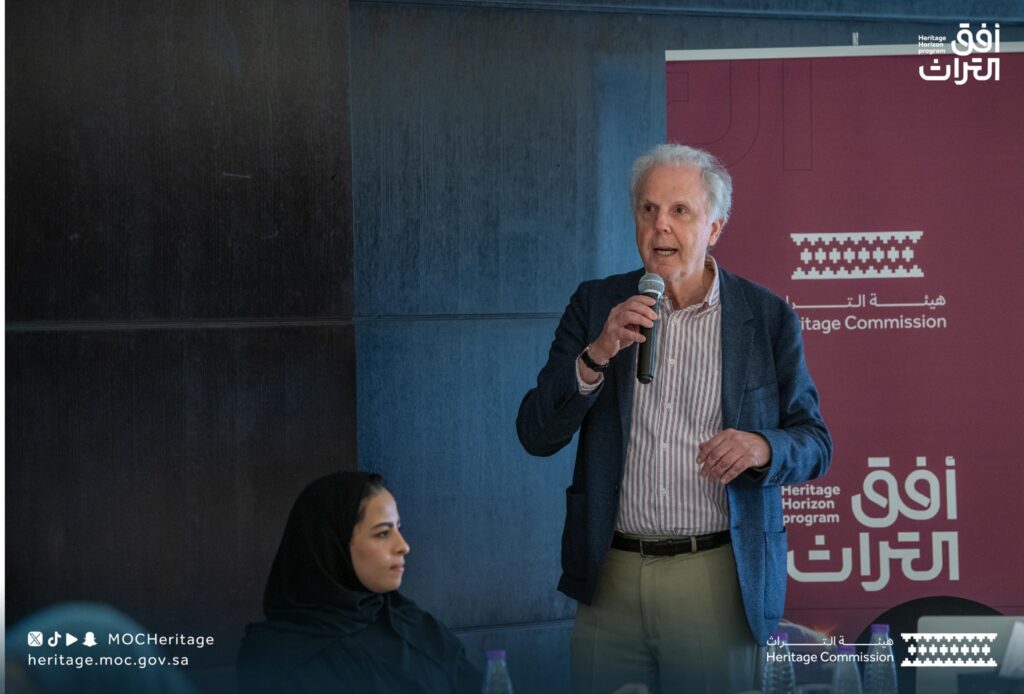
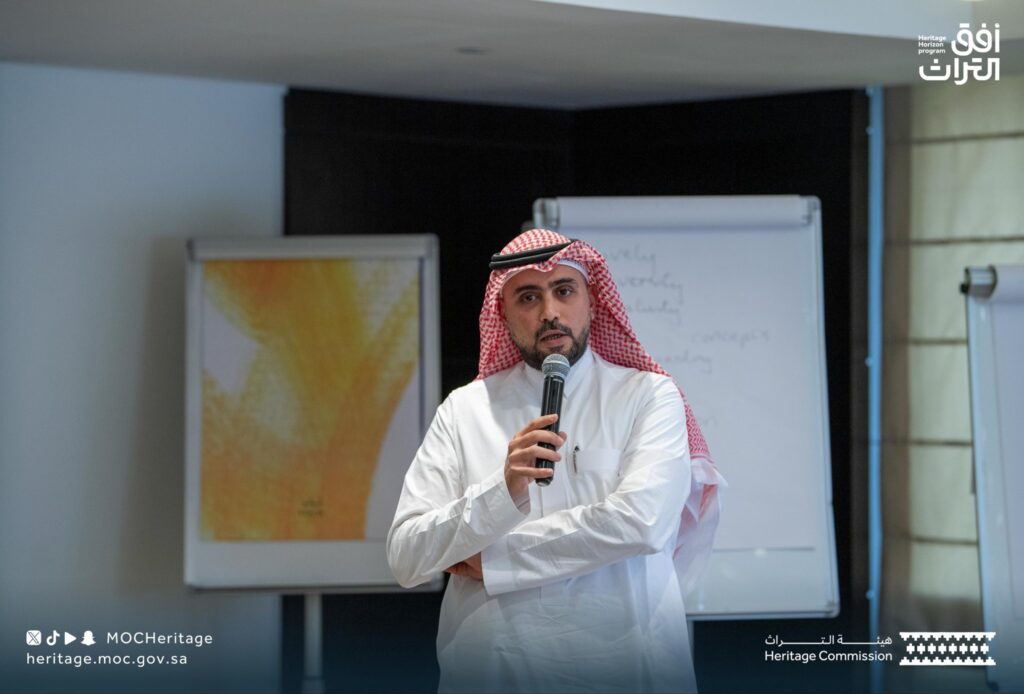
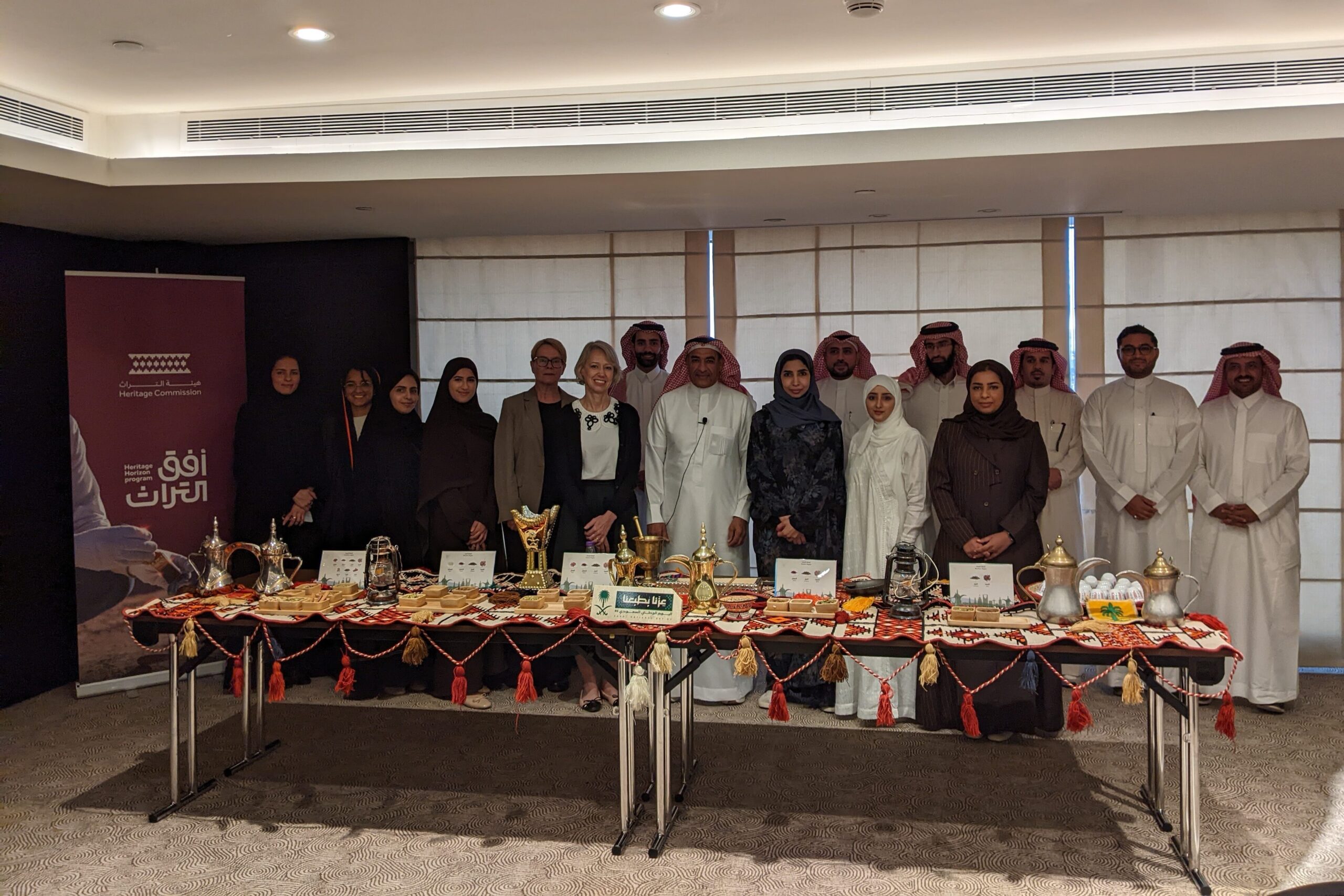
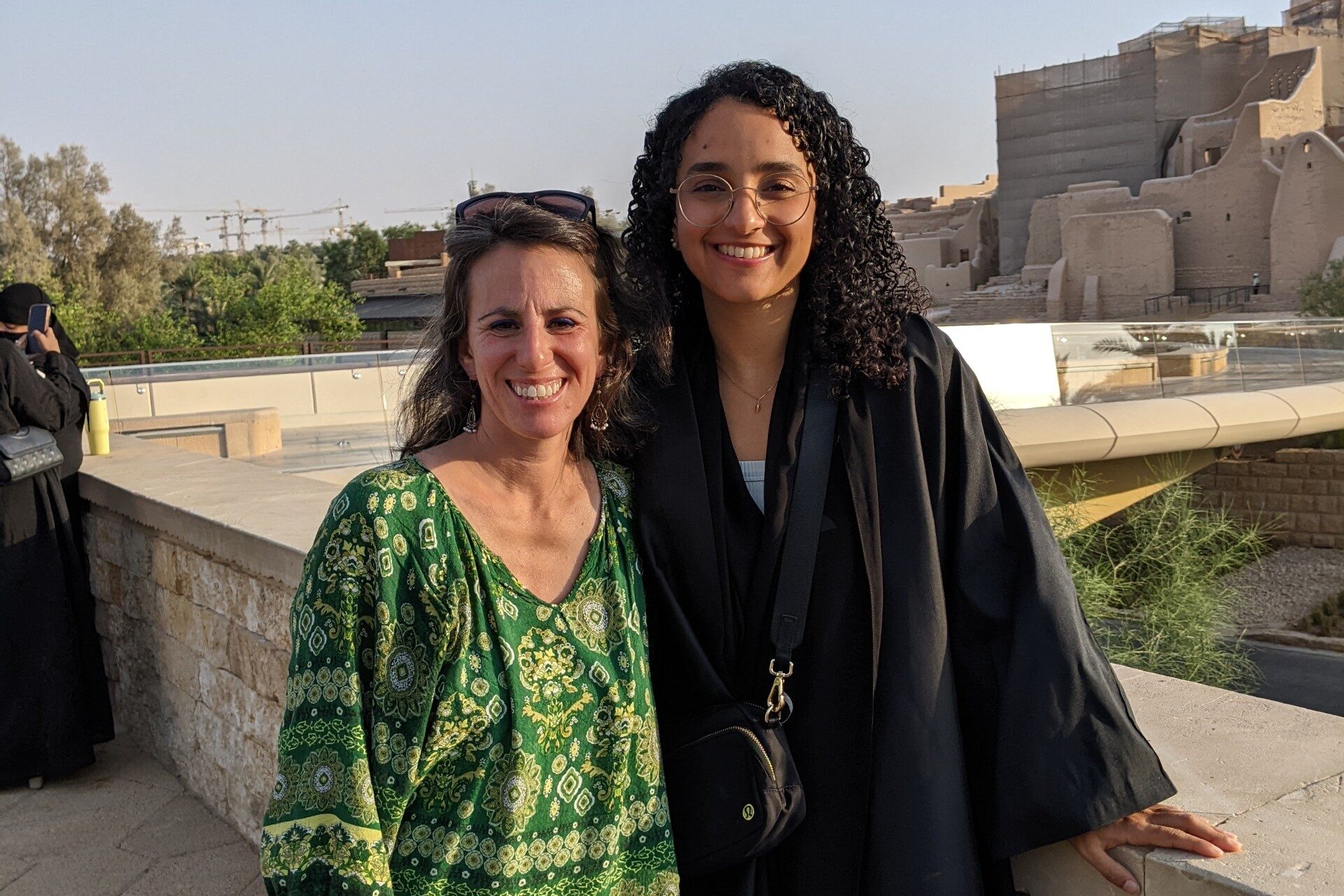
Building a Global Presence for Saudi Voices
Participants—ranging from academics in media and literature to professionals in architecture and archaeology—engaged deeply with the workshop content. The sessions fostered collaboration, knowledge exchange, and a shared commitment to showcasing Saudi heritage on the global stage.
On the final day, each participant presented their research topic, marking the beginning of a nine-month journey to develop a publishable academic paper. This journey includes:
- Two online modules on research fundamentals and technology in research.
- A closing seminar in London, where participants will present completed drafts of their papers.
Strengthening Saudi Arabia’s Research Ecosystem
The Heritage Horizon Program is part of the Heritage Commission’s broader mission to enhance research capacity and amplify Saudi heritage scholarship internationally. By equipping researchers with the tools and support needed to publish globally, the program contributes to a more connected and recognized Saudi academic community.
Years before joining the IIE Scholar Rescue Fund program, Carly O’Connell spent a year in China teaching English to middle school students. The experience advanced her years of Chinese language study, allowed her to share American culture, and gave her the chance to learn from her students.
Years after I’d left China, an email appeared in my inbox that brought back a flood of memories. One of my former middle school students was asking for advice on applying to U.S. colleges. That couldn’t be right, could it? I did the math. Yep, all my 7th and 8th graders would be graduating high school now.
I remember this student in particular. Let’s call her Annie. Annie is hard of hearing. In the U.S. school system, I would have been briefed about her disability and received an individualized education program about how to best accommodate her needs. In Annie’s case, I found out on the first day of class when I called on her to answer a question—her classmates rushed in to tell me she couldn’t answer me because she can’t hear so well. She brushed her hair aside to show me her hearing aid. But I refused to simply ignore her over the next 10 months of my oral English class.
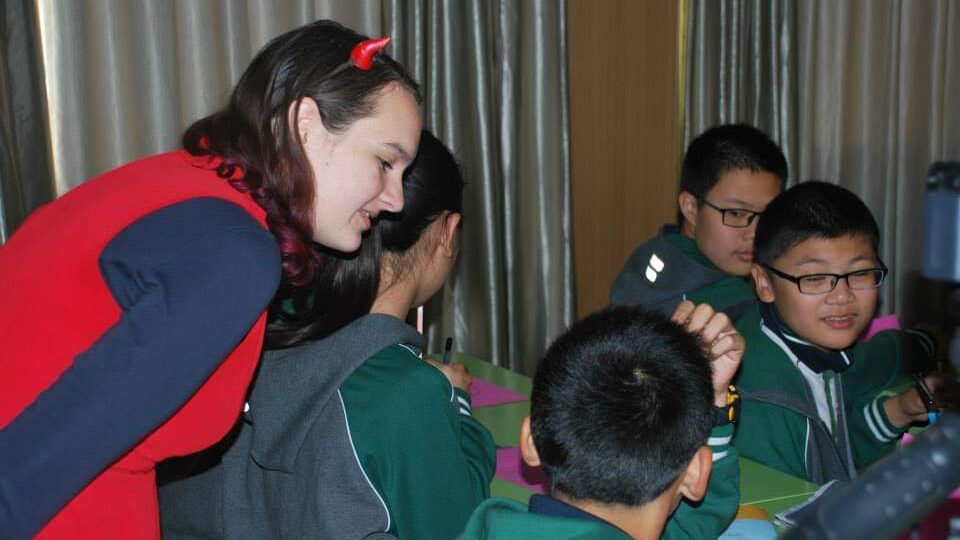
I created written handouts for her to supplement my lectures, and worked to add elements to my lessons that she could fully participate in. Annie’s favorite lesson was the day I asked my students to draw a picture of a superhero (complete with an English name and some superpowers in English to make it a little educational). Annie was quite the artist, and she excitedly flagged me over multiple times to translate superpowers such as laser vision and super strength. I was never sure if I was doing enough to include Annie, but hearing from her all these years later showed me that I must have made an impression!
A few months into the school year, the local news station contacted me to ask to film a day in the life of an American English teacher. The film day happened to be Halloween, so they captured me coming to class in a Halloween costume and teaching my students to sing, “This is Halloween,” from The Nightmare Before Christmas. Sharing my favorite holiday with my students helped make up for missing home. In return, my students and neighbors shared their holidays with me, gifting me flowers for Teacher’s Day and inviting me to eat mooncakes on Mid-Autumn festival.
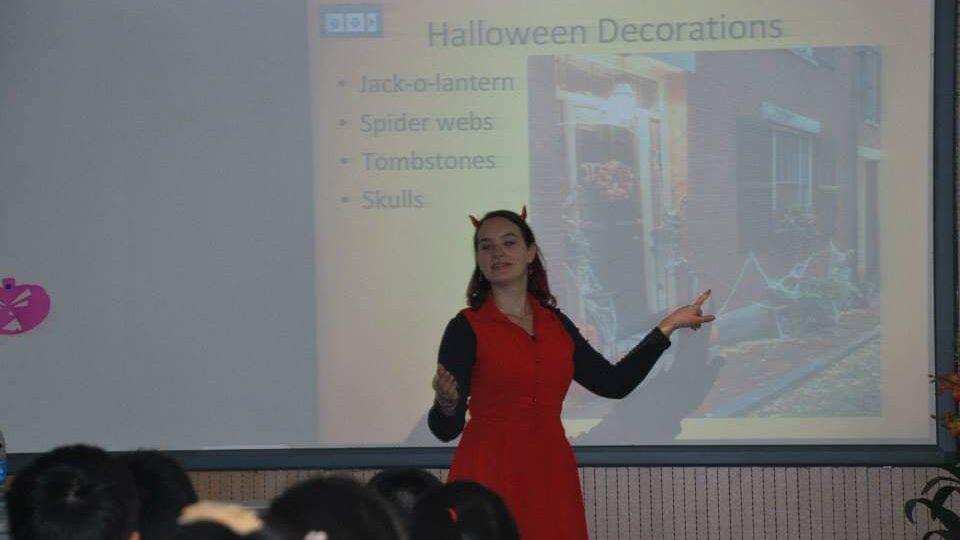
I hadn’t expected to be homesick because this was my third trip to China. Fortunately, a little piece of home was coming to my city. The local museum was preparing to receive a touring exhibit from the National Museum of Asian Art! I signed up as a volunteer, which involved interpreting for the curator as he visited to set up the space. I also hosted a talk at the museum about identity in the U.S. to help visitors understand the ways the artist incorporated her Black, white, and Native American ancestry in her art. At first, my audience didn’t understand why many Americans might continue to identify with countries their ancestors immigrated from generations ago or the nuances of mixed racial identities. By relating to more familiar identities, such as how many of them had ancestral hometowns in the countryside that they returned to on Lunar New Year, or how their parents might speak different local dialects from each other, I encouraged them to relate to the art while also learning from it.
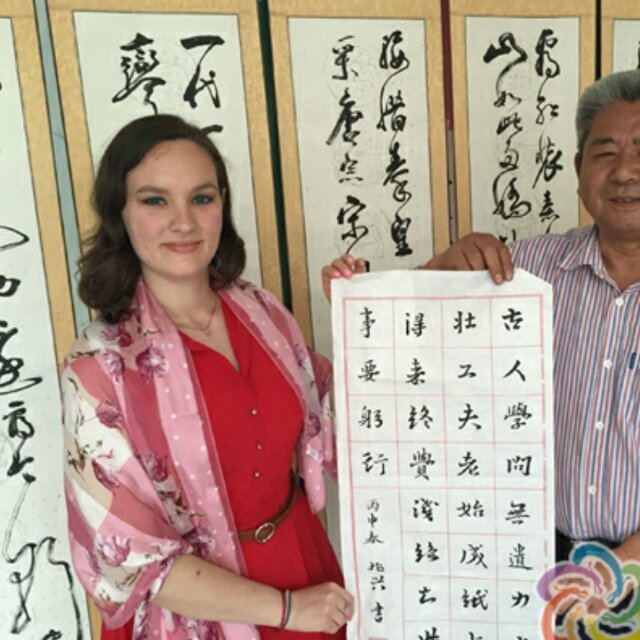
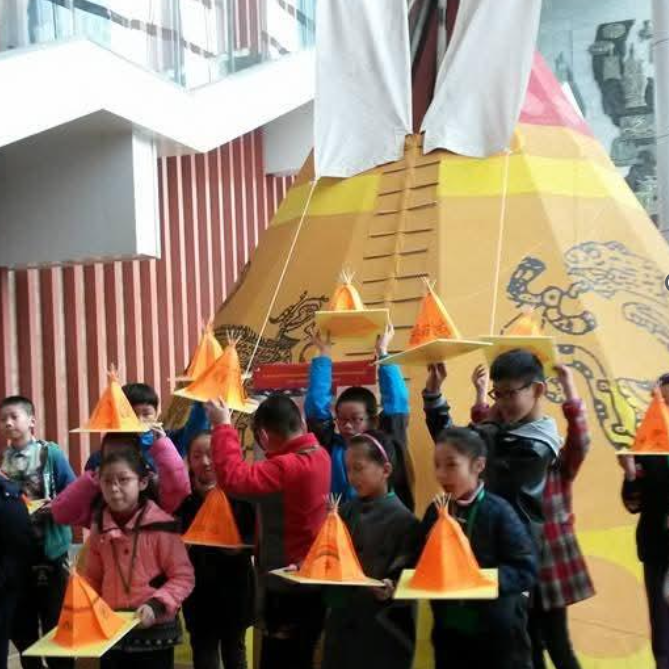
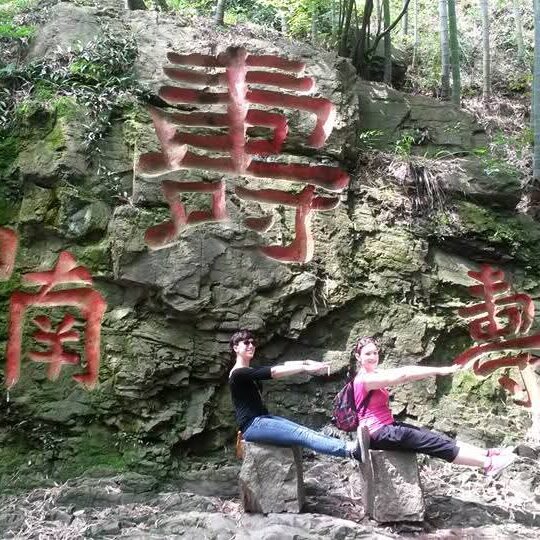
Teaching tweenagers on the opposite side of the world was sometimes challenging, but I saw this experience as the culmination of spending half my life studying Chinese language and culture, and an opportunity to return the favor. Where else could I have found myself frantically looking up the Chinese words for “drywall” and “plywood” as I facilitated a debate between a curator and museum staff about whether a wall could be knocked out for an exhibit? Or had a news crew film my walk to work as I shared mundane details of my life? Or shared pictures of the deer in my parents’ back yard to oohs and ahs from my students? I may have taught them some English words and facets of American culture, but they taught me to see the learning opportunities in everyday life and how to reach across differences to reach mutual understanding. Together we created memories none of us will ever forget.
How has your international education experience impacted you and others?
Before starting her career in international education, Abby Reilly, Global Partnerships and Events Manager for the Benjamin A. Gilman International Scholarship Program (Gilman Program), met an international scholar from India whose friendship changed her life and career path.
The first connection I made in international education set me on an unexpected course, in both my personal life and professional career.

In 2014, as an AmeriCorps*VISTA at the University of South Carolina Aiken, I was placed in on-campus housing with a Fulbright Scholar, Mukulika, from India. The institution only had one person dedicated to study abroad and international student services, so I found myself eagerly stepping in to help her adjust to life in the U.S. What started out as scheduling grocery store trips and other errands turned into movie nights, attending temple, enjoying free concerts at the local park, cooking together (really, her teaching me how to cook!), and exploring the Aiken and Augusta areas. We formed a wonderful friendship, based in curiosity and mutual understanding.
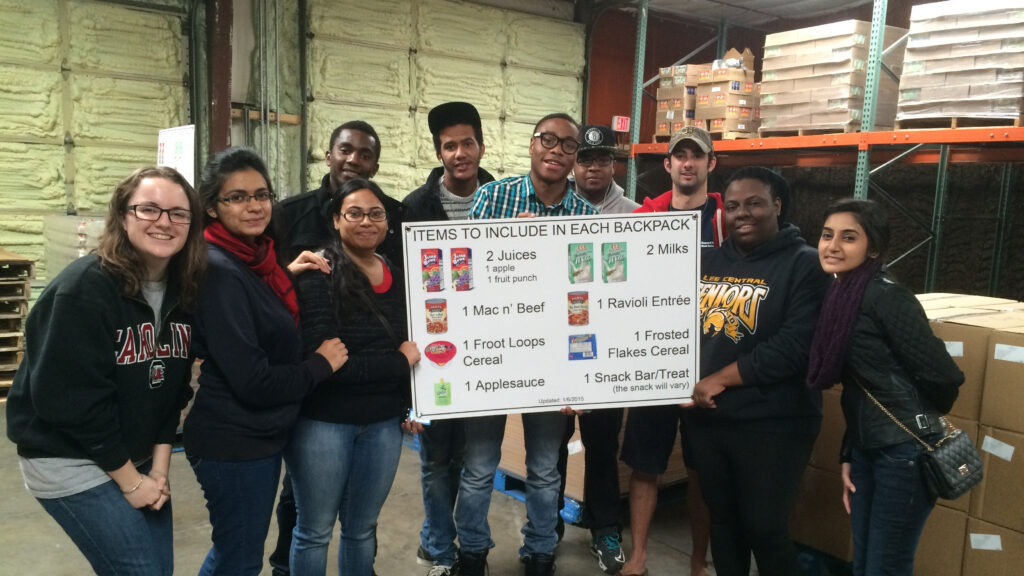
One day, Mukulika asked me to drive her to an event for local Fulbright scholars at University of South Carolina-Columbia, my alma mater. That event happened to be sponsored by the Institute of International Education (IIE). Being exposed to IIE’s mission for the first time that night changed my perspective in many ways. It overwhelmingly affirmed my interest in pursuing a career in public service, but, for the first time, I saw that career path through the lens of international education. As much as I wanted to help people and communities through acts of service, I also wanted to connect with and learn from people. I also learned that even if we speak the same language, we all have much to learn from and teach one another. The connections formed in that kind of exchange can lead to healthy, mutually beneficial partnerships.
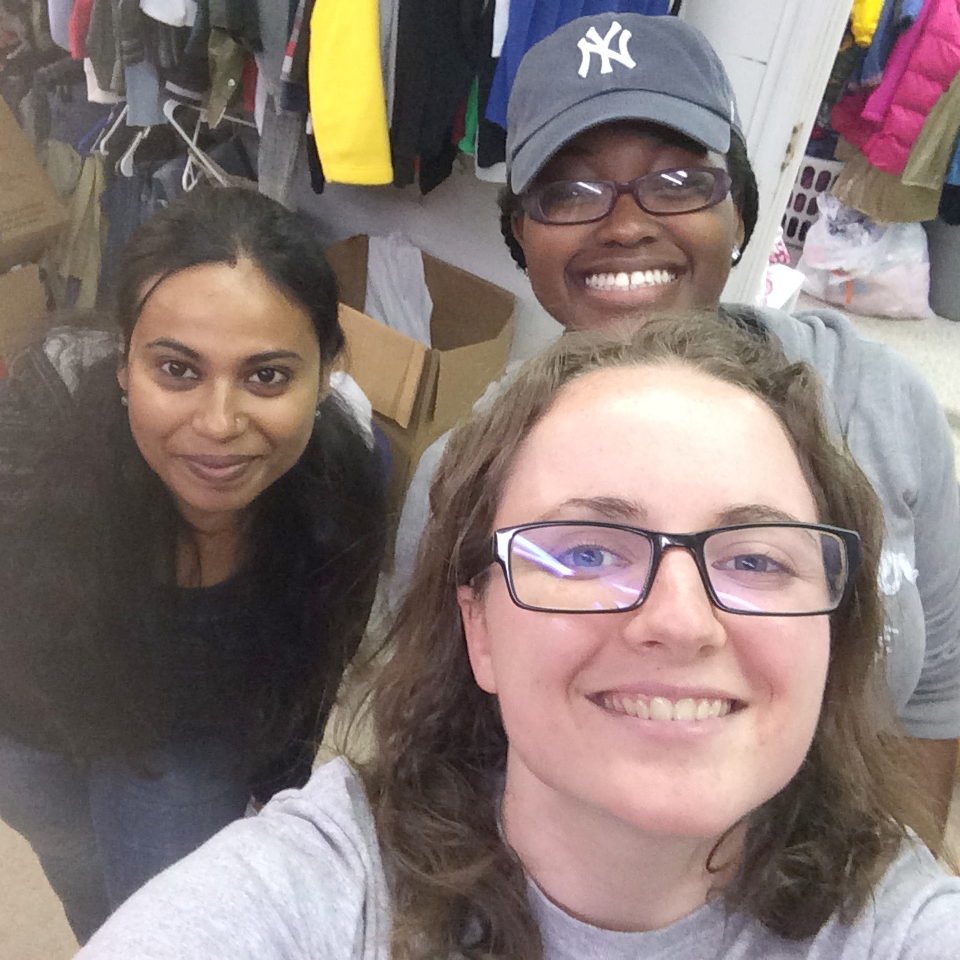
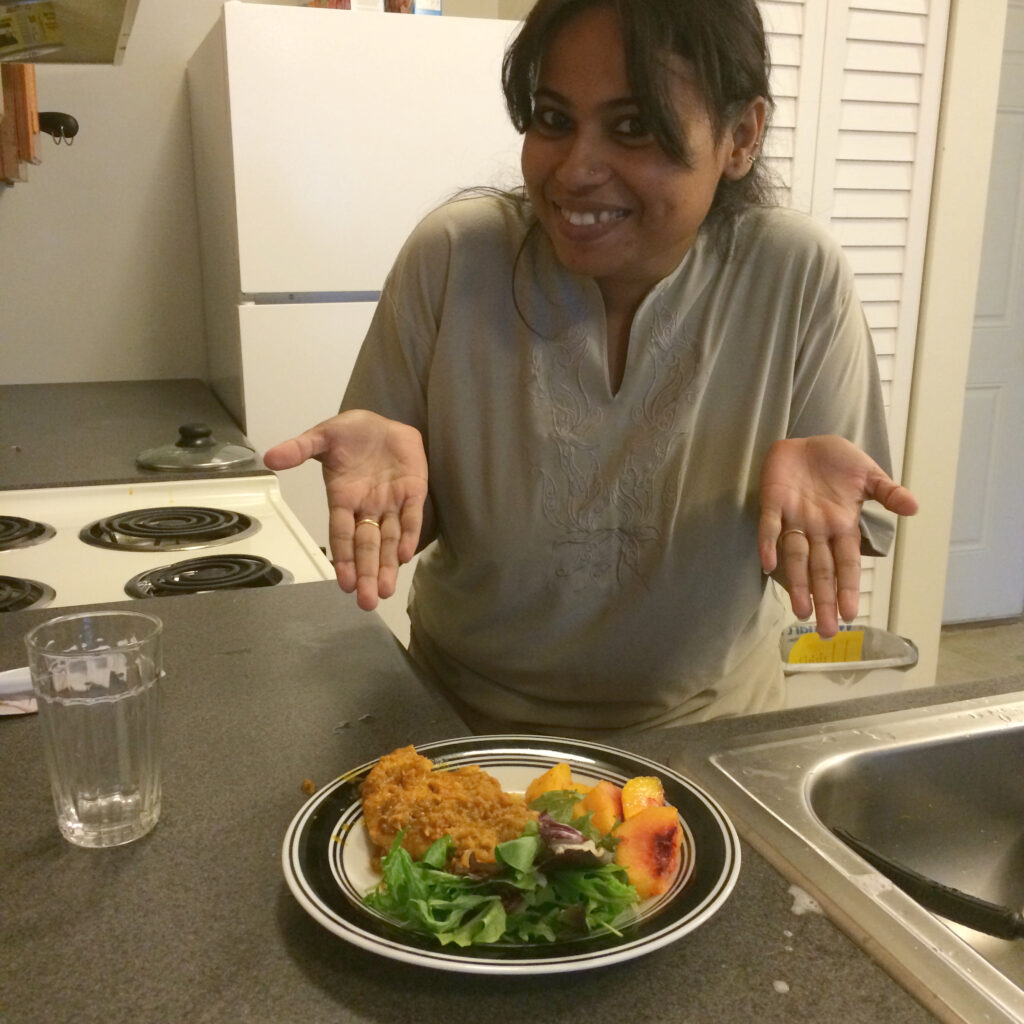
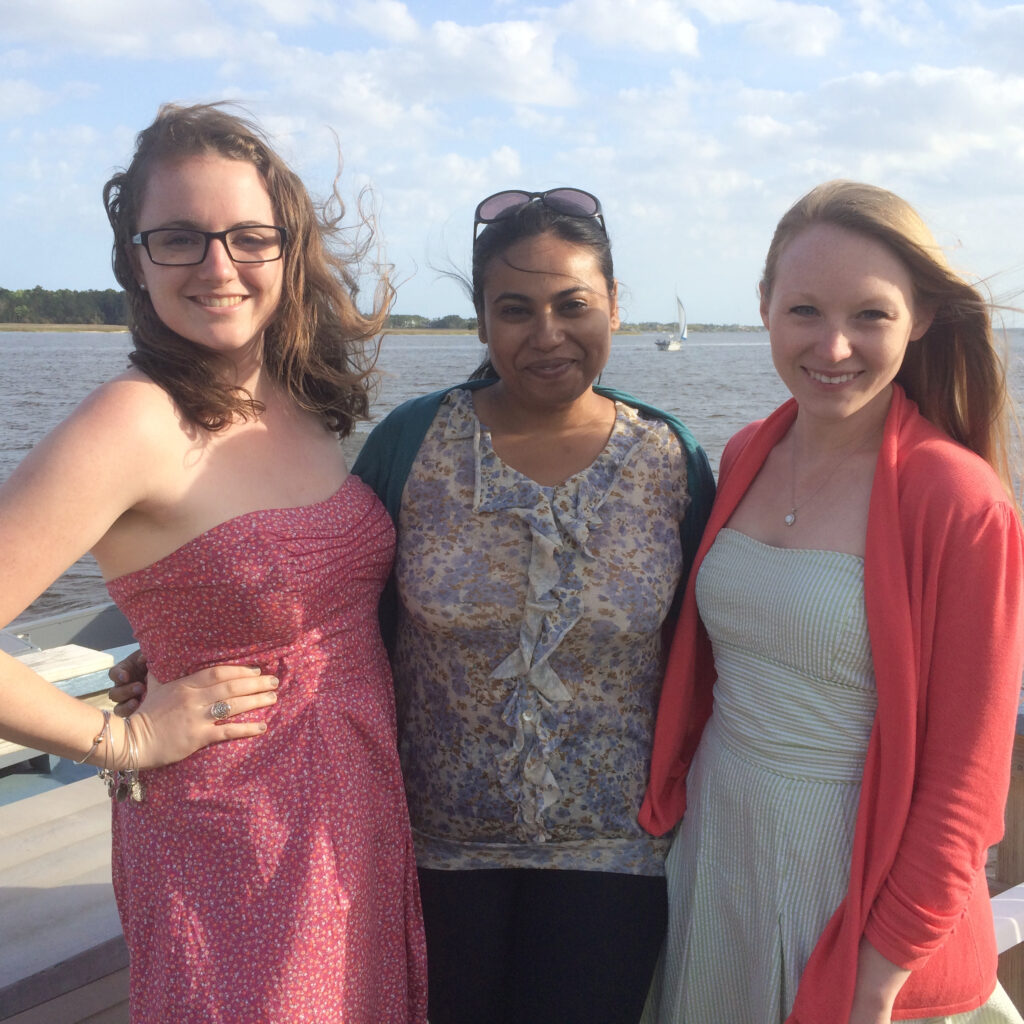
The spontaneous connection with Mukulika further encouraged my empathy and widened the scope of what I thought was possible for myself and others. Initially an introverted, nervous young woman, I was given the courage to explore and travel outside of my comfort zone. Through teaching English in Benin and working in international higher education on U.S. campuses, I learned that education without consideration for the international context is like reading a black-and-white textbook. It’s possible to learn from it, but the depth of understanding, innovation, and creativity that global perspectives and connections naturally bring are missing. Those connections we make across cultures bring the necessary color, texture, and life to our knowledge of ourselves and each other.
Ten years later, I’m now working at IIE as part of the team that supports the implementation of the Gilman Program. I feel so grateful to work with a program that aligns with the beliefs shaped in part by that first connection made with Mukulika. Chief among them: International education shouldn’t be an option, only available to those who can afford it. Rather, it should be accessible to all. Because engagement and exchange on an international scale are essential in shaping the skills and knowledge we need to create an amazing future together.
